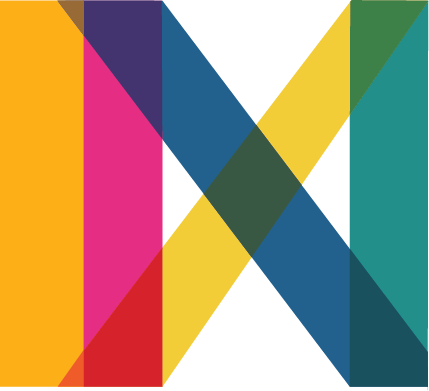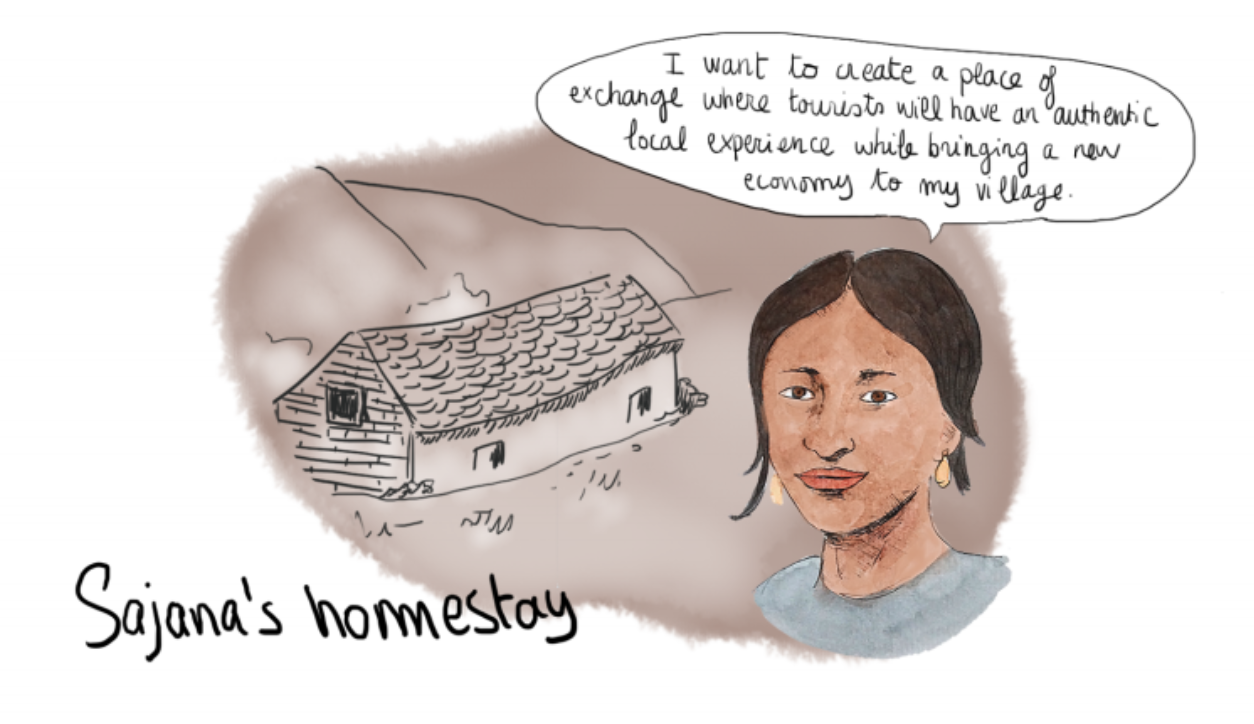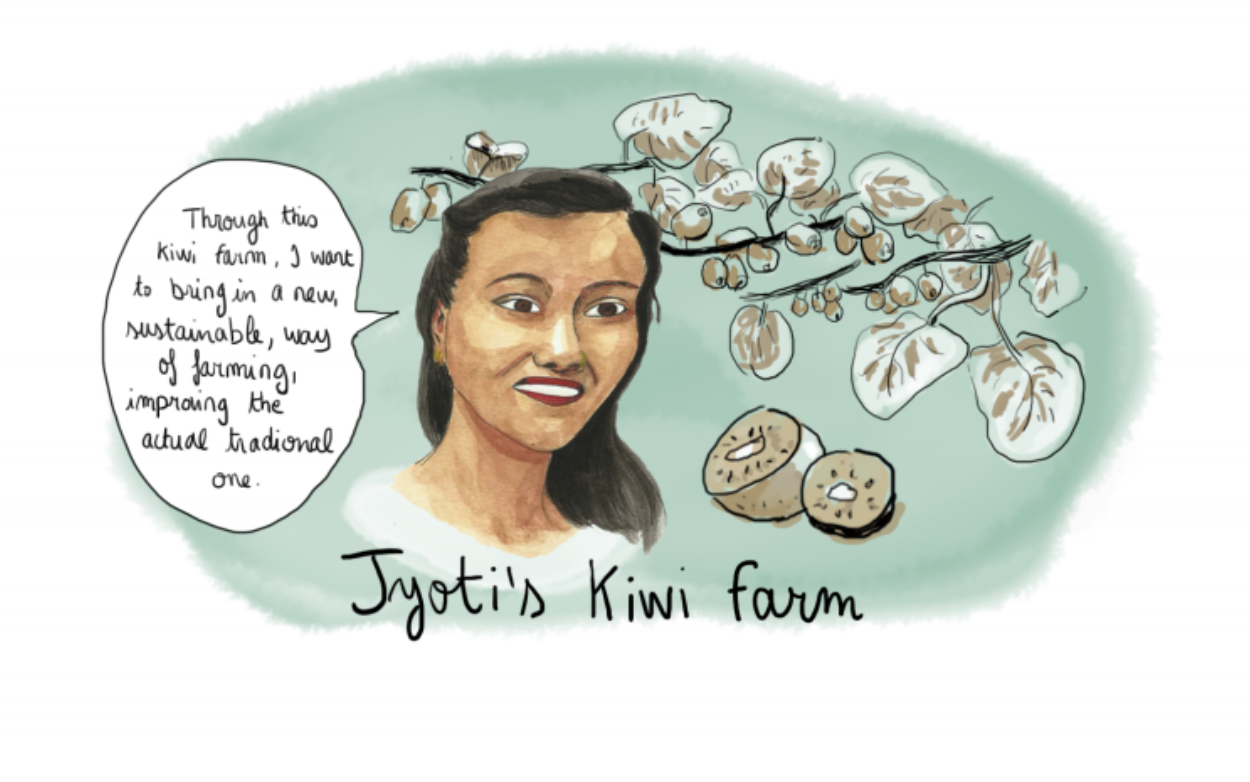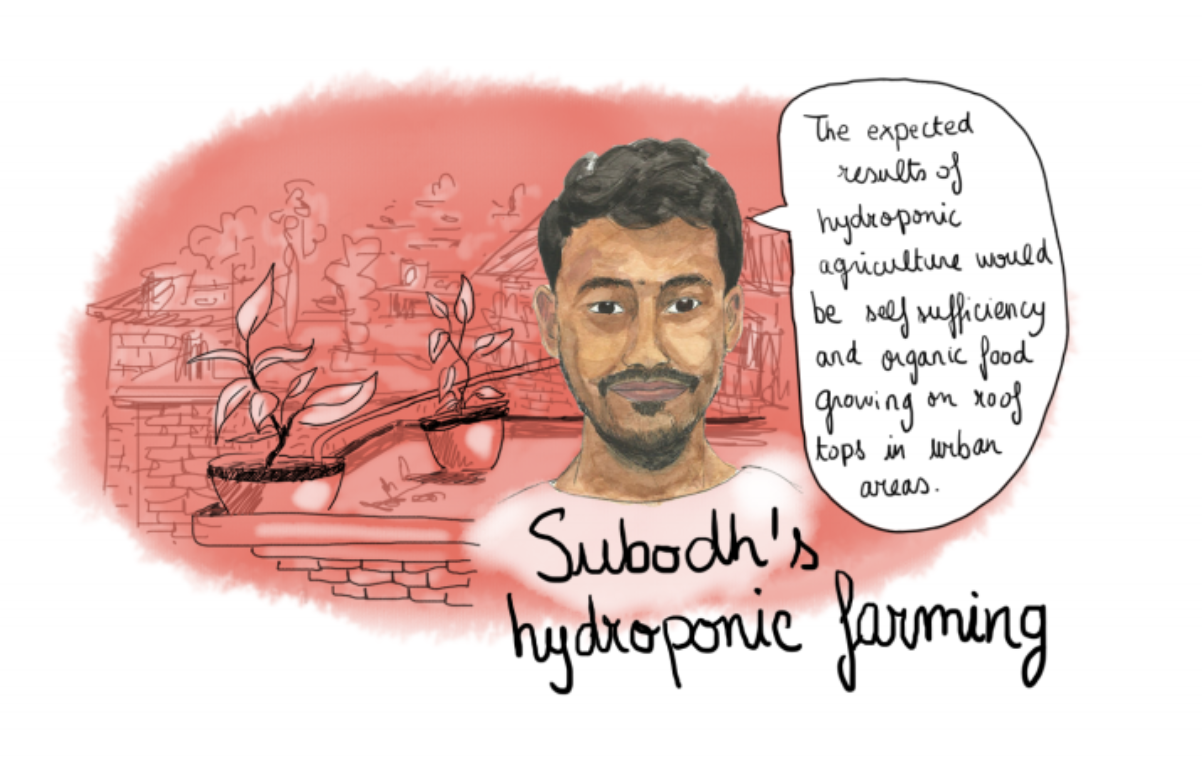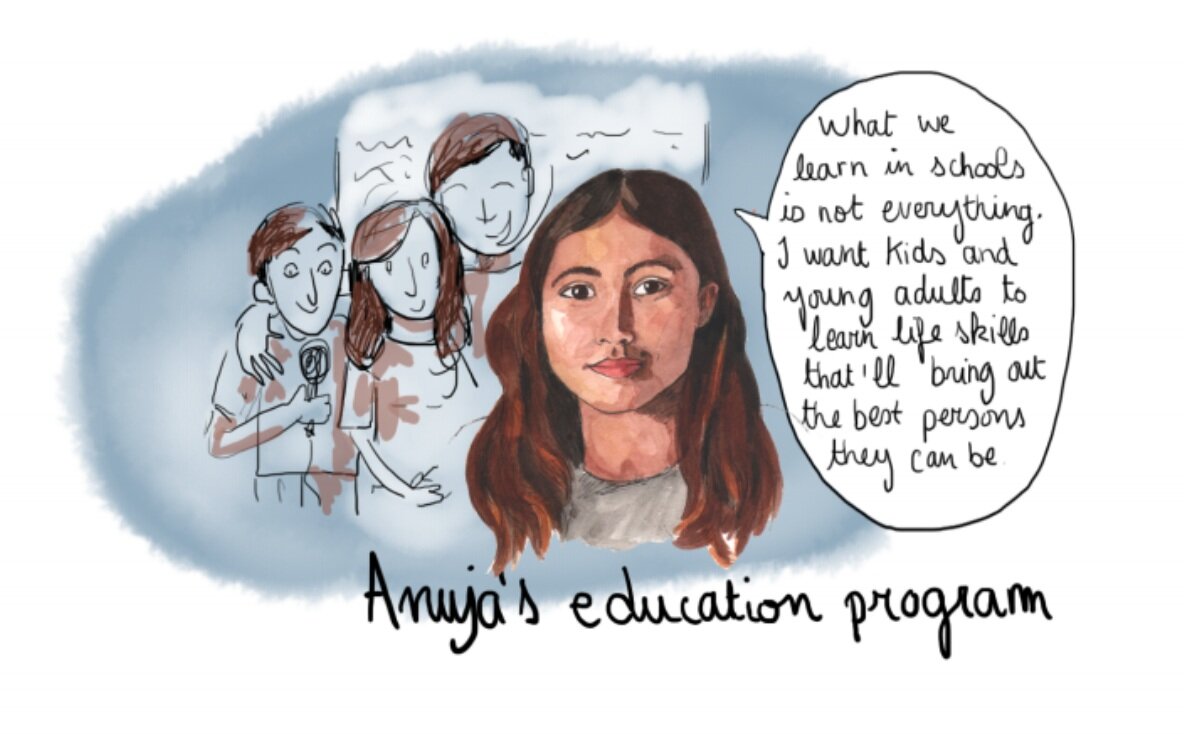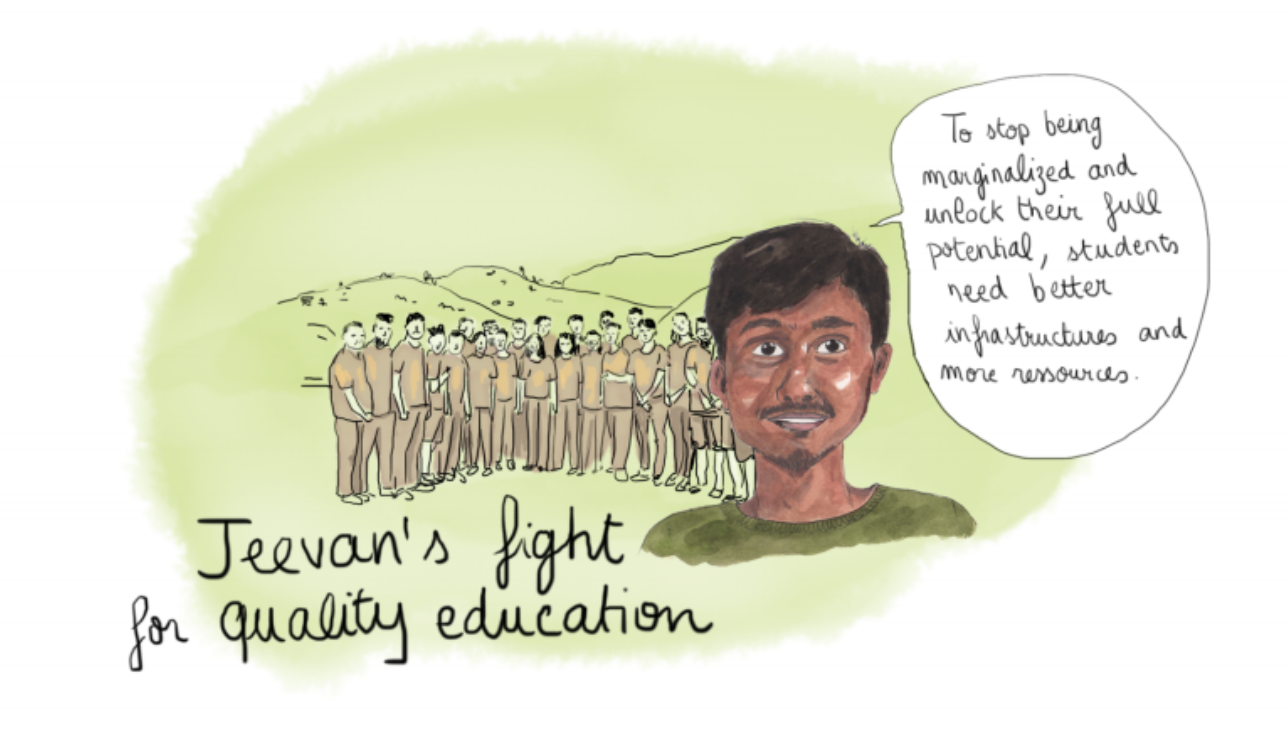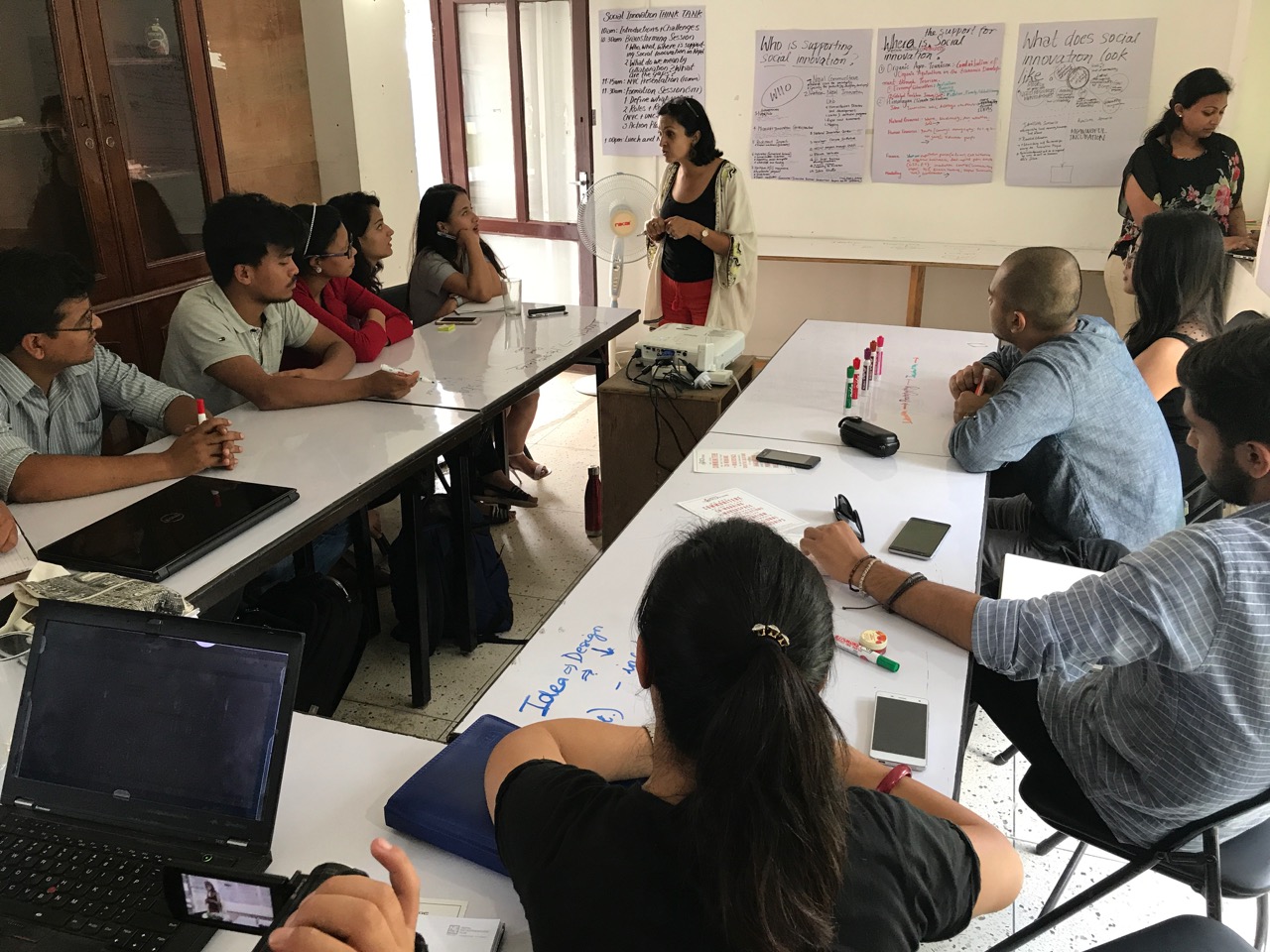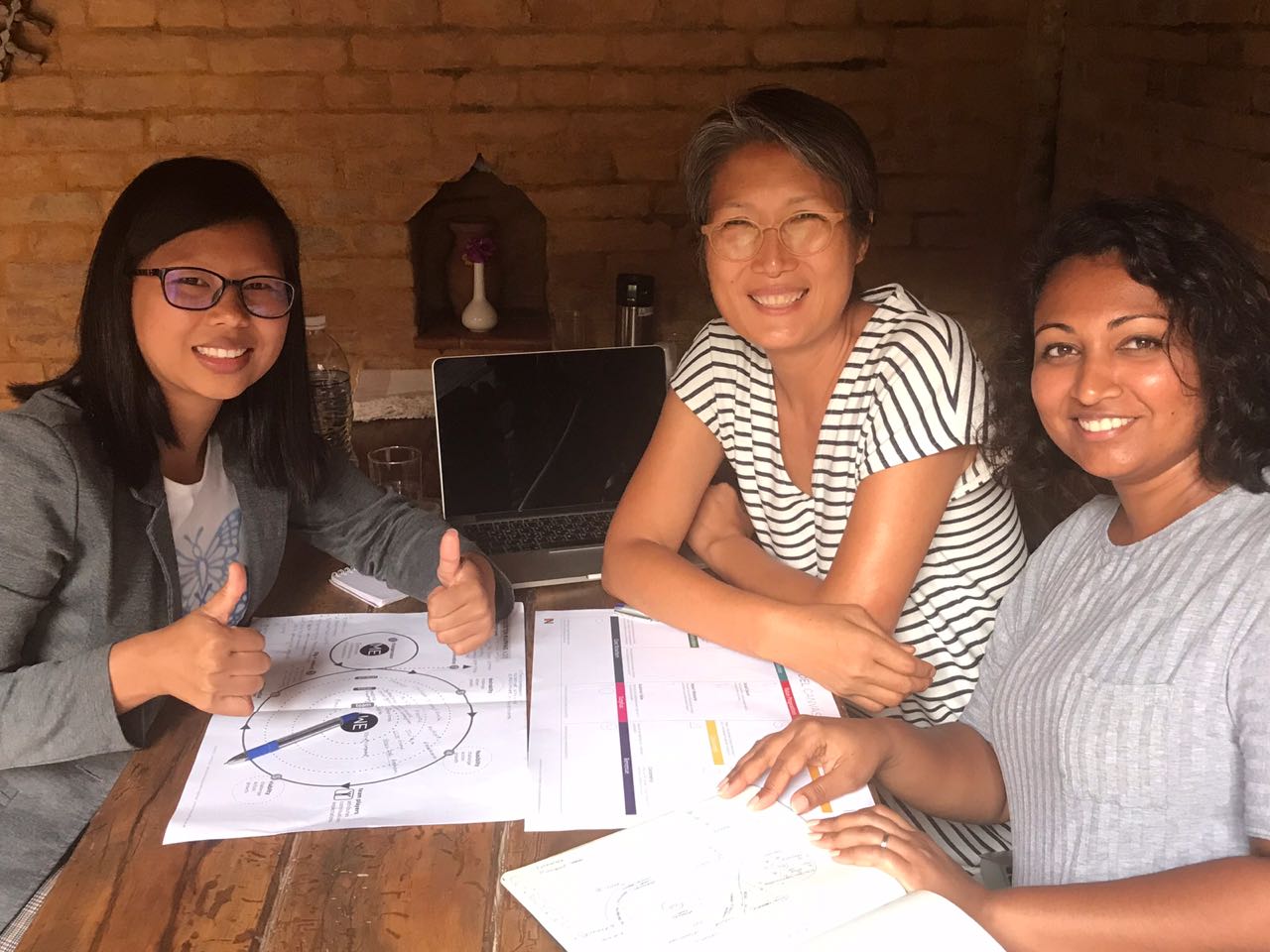
2016-2018
UAE/NEPAL/Connect (UNC )
COMMUNITY
CHANGEMAKERS
1. Pabitra S. Majihi
Pabitra Majhi is an enthusiastic and energetic youth activist, who is the Vice President of Nepal Youth Innovators and also working as a Programme Officer of Youth Led NGO called Girls Empowered by Travel Nepal. Currently, she has been pursuing her master's degree in Economics at Patan Multiple Campus and very passionate about positive social change and youth empowerment who has been leading a winning project named “Shahasi -The Brave Women” in her home town Sarlahi to empowers disadvantaged and marginalized women through basic adult literacy programme and micro enterprises . Moreover, she is also one of U. S. Embassy Youth Council Member for 2017-2018 . She loves photography and dancing. She is someone who is sweet , kind and funny and someone who likes getting along with people irrespective of who they are .Her ambition is to be a good social entrepreneur and contribute to the economic development of the nation.
2. Shashank Poharel
Shasank is an agriculture student interested and involved in different agriculture related projects. After 9 days of UNC 2018 boot camp, he is nowadays more confident communicating in english language and another impact is that he now employs more cautious approach while dealing with any new ideas and projects. It means before preparing the proposal or concept note of any project ,we need to have more detailed study of regarding project.
Currently he has been involved in different project Channel Hive', an innovation-centered project for the betterment of Apiculture, project Sisnoo, which is based on the indigenous foods and crops in Nepal and research project titled "Farming of Forage Crops in Hydroponics System For Rabbits".
He is very honest and community concerned person who does not necessarily think to work on prototype just to utilize the fund they are getting. Because, in the end it should be beneficial to farmers and be innovative yet simple and cheap enough to produce commercially. Besides that in his leadership, NYI had organized “Entrepreneurship and Idea Pitching Bootcamp” in Dharan. The required technology and materials in bee hives are very expensive and not environment friendly so that his team is looking for alternative. They also have long term plans for the Project Sisnoo and have been researching 6 hours a week. He seems very Passionate and Dedicated change maker.
3. Sajana Bhdel
Sajana has just obtained her Masters degree in Economics and is working as a Programme Associate in the organisation “Proposals for NGOs” and is a passionate traveller. Besides that she is running a youth led NGO called Girls Empowered by Travel Organization, where she is the President. After UNC she has became more familiar with the meaning of social entrepreneurship. She is from a village named Changunarayan (World Heritage Site), where she was aware of many social issues, including of violence against women, but was unable to do any appropriate work on this issues. When she joined the boot camp she came up with an idea of Champak Namuna Home Stay so that she can help such women economically.
Currently, she is leading that project with the help of GET and started a home stay one year ago; her homestay has already served more than a hundred guests (National and International). Now, she wants to expand this homestay project as a community home stay and has already had many meetings and discussions with concerned persons of a travel agency/s, community home stay Association etc. A few days ago, her project was listed among 20 Startup in a National Event called Nepal Startup Meet 2018. She is looking for appropriate and sustainable partnerships or collaboration opportunities and also financial support. She is a very Passionale and Community-driven Changemaker.
4. Jyoti Dangal
Jyoti Dangal is a student / social worker, interested in raising awareness of social and environmental issues. Before the Bootcamp, they were unemployed but felt like they could still help others, despite being very poor. As a result of the Bootcamp, they have been able to realize that an enterprise can be started with very little money, and learn more about creating a social business model. Now they are embarking on a new kiwi farming project with their family and hope to prove that this would be a sustainable and worthwhile initiative to be engaged in. In the next phase of their project plans, they are looking forward to recovering their NRS 70,000 investment and validating the concept of Kiwi farming in their community (village) and Nepal more broadly. Their transformation is in their ability to realize they have more than just their words to contribute and they seem to be an Engaged and Developing changemaker.
5. Subodh Pandey
Subodh Pandey is an Agricultural student studying in Chitwan (out of valley). He wants to help village farmers by introducing Hydroponics as a farming practice for infertile land. After attending UNC Boot camp 2017, it has boosted his confidence to take on leadership roles in different situations. He has emerged as a problem solving, energetic and enthusiastic leader in his field work. He had not coordinated any high level program before participating in UNC 2017, but after the program he was able to coordinate a National Level program successfully. Due to his tight schedule of studies and examinations he was not able to make progress towards this project, but he remains enthusiastic and interested. He will be able to implement it and believes that many farmers can benefit from this new farming technology given the country’s high urbanisation, if he gets the appropriate guidance and donor support.
6. Anjuna NiroulaI
Anuja is an educator and instructor at an INGO named Papa's House under Nepal Orphan's Home. She has been working there with the orphan kids and adult women.The bootcamp was the turning point of her life where she got to realize on what she really wanted to do to bring positive changes in society. The most powerful thing she has been practically applying in her life is the Value proposition canvas and the essence of teamwork. She is in the initial stage of her project; her pitch at the boot camp was about creating a connection and network which would make herself able, experienced and ready enough to execute her project.
7. Jeevan Bhusal
Jeevan Bhusal is a dedicated community leader interested in bringing more literacy programs to rural regions. He was already committed before the Bootcamp, and had started working with a small number of students. As a result of the Bootcamp, he has been able to increase his confidence and learn more about mobilizing a large number of volunteers to execute outreach programs. Now he is working with social work associations to build libraries in the Rolpa region and hopes to impact even more high potential students. In the next phase of his project’s plans, he is looking forward to securing additional external financial and technical expertise. His transformation is in his energy levels and self-belief, and he seems to be a Dedicated and Community-driven changemaker.
international mentors
Amin Matni mentoring participants for their social enterprise pitch
Amin Matni established two companies in the creative industry in Lebanon and Qatar to service a myriad of public and private entities between 2001-2011, managed the center of Design Innovation for 4 years during which he developed and delivered the Social Innovation Initiative at Qatar Foundation. He coached students, faculty, staff and professionals to collaborate, co-create and generate seed ideas with high social value. He joined Qatar Business Incubator Center as a program manager to lead programs’ content creation, management and dissemination. He is passionate about innovation processes and value creation. He lately co-founded PASSA, an NGO that addresses the drowning challenge across Lebanon, Qatar and Dubai.
Pooja Addla Hari is a junior at ASU double majoring in Technological Entrepreneurship & Management (TEM) and Economics with a certificate in Cross-sector Leadership. Indian by birth and multi-cultural at heart, she enjoys helping people reach their goals and succeed. Love, respect, courage, creativity and continuous learning are the values that she lives by and works with. Being someone with interdisciplinary interests, what she does best is bringing people, ideas, and resources together to solve complex problems effectively. One of her life’s biggest goals is to strategically combine the best of technology, the beauty of art & culture with the goodness of nature to create a sustainable world. She is currently working to advance the UN Sustainable Development Goals on Education, Economic Growth and Partnerships through her startup—ThaCult, changing how students explore and choose careers. She is also working on numerous other sustainability student engagement through Changemaker Central at ASU and entrepreneurship student engagement through ASU Entrepreneurship + Innovation. Connect with her (paddlaha@asu.edu) if you want to be the change that you wish to see in the world.
Robert Ferr is a registered architect and LEED accredited professional with two decades of professional practice experience on both consultant and client sides. He has contributed to the sustainable design strategies for many development projects around the world, including Masdar City, Abu Dhabi. His concept designs pushing the envelope of building-integrated renewable energy technology have been published widely. Through the Land Art Generator Initiative (LAGI), he is able to help support the critical role of architecture and urban design as part of a comprehensive solution to climate change. Robert is a graduate of Carnegie Mellon University.
Martin Marchetti is a budding permaculturist from Argentina, with a background in civil engineering and architecture. His journey began more than 10 years ago, when he found Permaculture whilst researching for his architectural thesis on sustainable urban practices. He completed the first Online PDC course in 2013, then began designing, researching and building a urban fertility program that after 4 years has proven to be drought proof, producing all of it's mulch material, building soil, producing food and having a huge impact on local biodiversity. He attended the July 2017 PDC, at PRI Zaytuna, where he met Geoff, Nadia and Salah and after a small volunteering incursion to the jungles of Borneo is now volunteering to be a part of Zayed University’s Permaculture Food Oasis.
nepal local mentors
Initial Launch of Local Mentor Collectives at Kathmandu, Nepal
Saurav Dhakal: is a British Council Climate Champion from Nepal who has more than a decade of experience as a journalist and storyteller reporting on public issues such as climate change and sustainability for media organisations such as Vashuda environmental fortnightly, Kantipur Television, Nepal info-park and Storycycle.com. His current focus is on grassroots adaptation methods developed by mountain people in Nepal, the transmission of such techniques across the region and the socioeconomic impacts of climate change in South Asia. His goal is to produce extensive communication materials that the government and people of Nepal can use to showcase the impact of climate change on the Himalayas and Himalayan communities and to influence international climate negotiations.
Santosh Shah is the Youth Activist and president of Today’s Youth Asia and Producer & anchor of the talk shows Power Talks. He has established Santosh Shah Foundation , whose goal is to empower innovative yourh Leaders and organizations from diverse backgrounds to drive the engines if Nepal’s growth and development.
Prabha Chaudhary director of the Baha’i teacher training center Thecho Lalitpur . I am also a full time trainer for pre primary education for 3-5 years old children. I provide trainings for mostly rural areas teachers to bring quality in education as well as provide opportunities to enhance their capacity to learn some methodology and skills that Urban schools have excess and take advantage of a very rich environment surrounded by them to benefit there from. We use a teacher’s training manual from Kenya and Uganda. Ugandan material manual gives them the overview to understand the role of the teacher in a society and Kenyan material provide the teachers opportunity to go through the lessons plans of pre reading, pre writing, pre math, and pre science. In addition to that we also use the government curriculum, take a look at the lesson and put our heads together and include some value education in it to make the lesson more realistic and active learning. We also use the program called Jolly phonics developed by a group of experienced educators from London. Our trainees like that program the most because not of us including the trainers had that opportunity to learn in our school time. We also put a time aside to read children’s story every day so that children from very early age get habit to read the book which we do not have at all in Nepal from parents side. We accompany them right after the training go with them and meet with the teachers and Principal of their schools as well as speak to the community they belong to so that teachers who just got trained by us feel comfortable and motivated to carry forward their responsibility. My educational background is masters degree in Rural Development Studies.
Prashant Singh: A social entrepreneur, philanthropist and development activist, Prashant, has been making efforts to bring positive change in his country Nepal through a variety of citizen initiatives. He is a strong advocate of, and believer in green future of Nepal as his country is blessed with immense green resources. He sees the lack of societal peace and harmony as the biggest threat to his country’s prosperous future, and is actively involving the country’s citizens, particularly its youth to build Sadbhaw (harmony) among the various strata and ethnicities of his country. He founded Himalayan Climate Initiative (www.himalayanclimate.org), a not-for-profit organization in 2011, and has been serving as its full-time CEO without seeking any salary or benefit from the organization. Prashant sees the environmental too significant an agenda to be left to the environmentalists only. He advocates for embracing Nepal’s Private Sector and youth as active stakeholders in the country’s development discourse and actions.
Bivishika Bhandari: Head of advocacy and Outreach at Himalayan Climate Initiative (HCI), lead of “Vagina Monologues” spaces to talk about women’s bodies, violence against women, gender and sexuality through the global movement, BA in gender and women studies,international studies and psychology
Hardik Subedi (National Volunteer) “If you think giving back to the nation is mere rhetorical, be a National Volunteer to materialize these words into action.” Campaigner of “No thanks I can Carry my own bag”, Completed BA LLB
Bahar Kumar: With her leadership, Bahar established Nepal Communitere so that it embodies the space where artists, entrepreneurs, thinkers and doers may find a place to play, connect, and catalyze viable opportunities for Nepali to build sustainable livelihoods. Bahar is an experienced strategist who fosters bold ideation to meaningful products and services. She has extensive consulting experience in business development, organizational development and community/consumer engagement in both the social and business sector in Nepal and the United States. Bahar holds a Masters in Public Health from Columbia University and a Bachelors in International Development and Psychology from the University of California, Los Angeles.Experienced strategist, consultant in business development (both the social and business sector in Nepal and the United States)
Supporters
Valeria Bidol
Operations & Finance CoordinatorDonya Saberi
Researcher and FacilitatorAdrian Permal
Documentary VideographerNatasha Hajee
Social Media CoordinatorAmina Al Mazoorei
Media Assistant & UAE Youth AmbassadorAbigail Saldanha
Activity Series CoordinatorAmin Matni
Consultant, Qatar Business Incubation Center, QatarPeter Martin
Consultant, Virginia Commonwealth University, QatarElizabeth Monoian
Consultant, Land Art Generator Initiative, USARobert Ferry
Consultant, Land Art Generator Initiative, USAKeshab D. Thapaliya
Nepal Coordinator


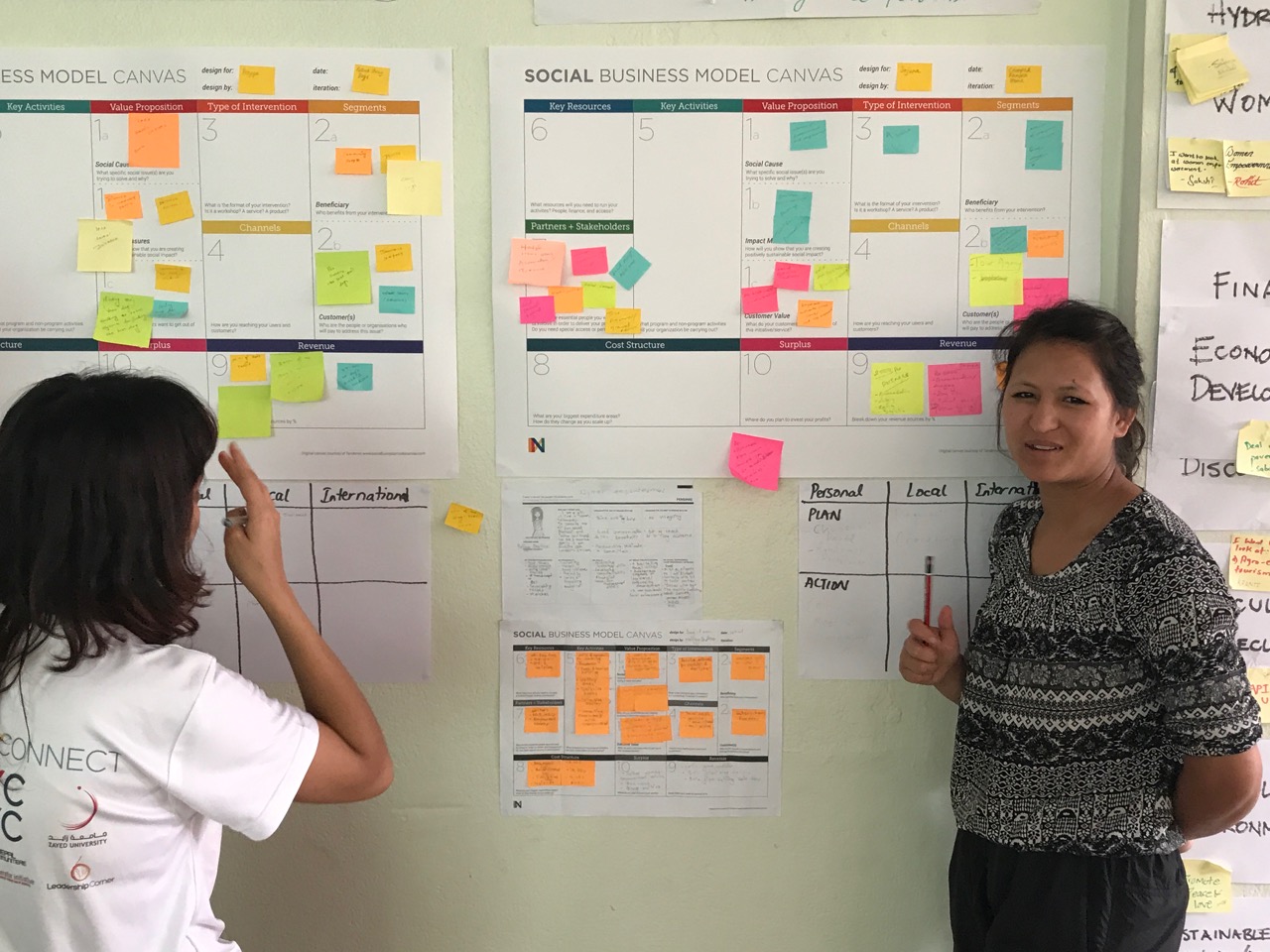
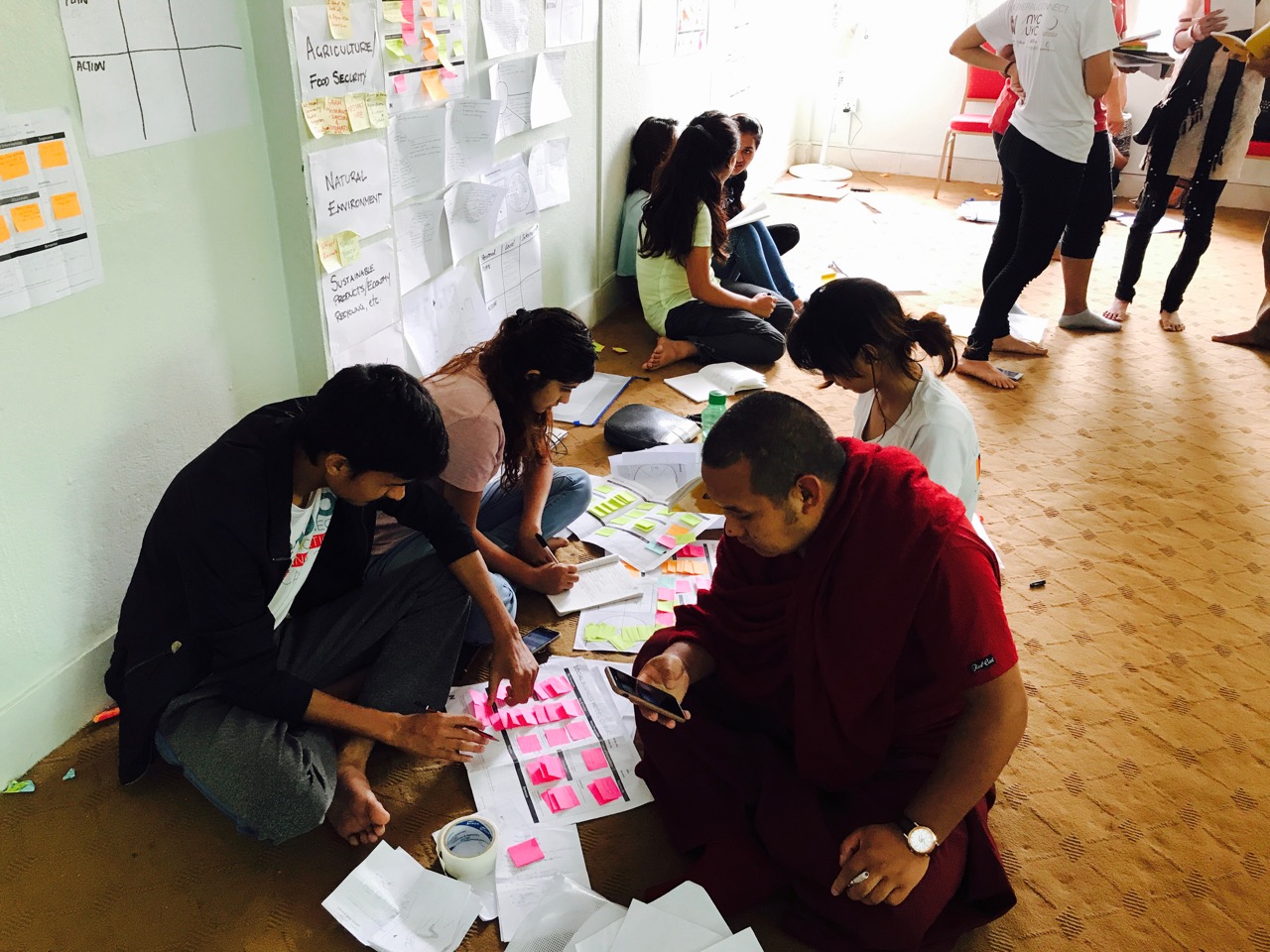

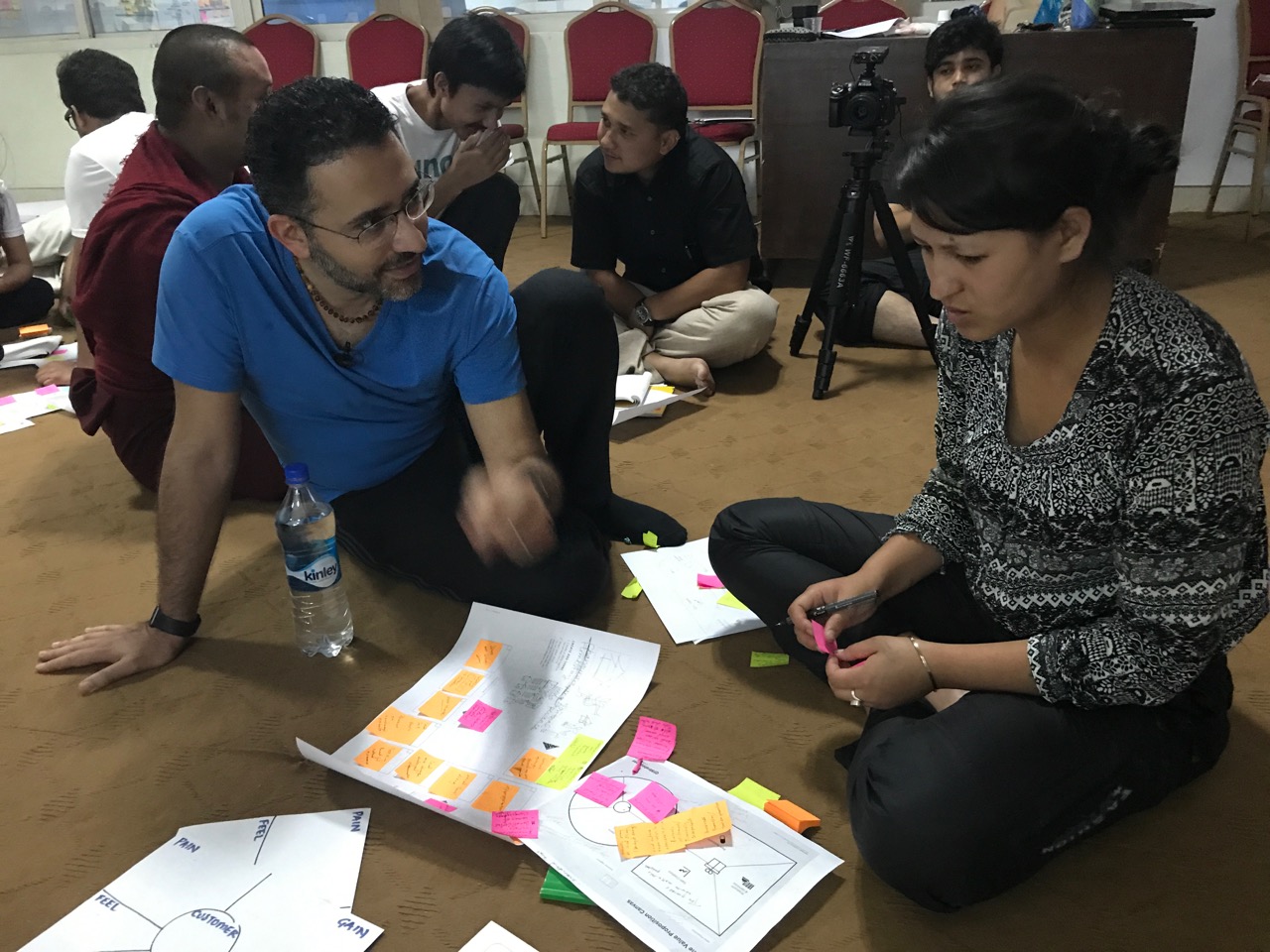
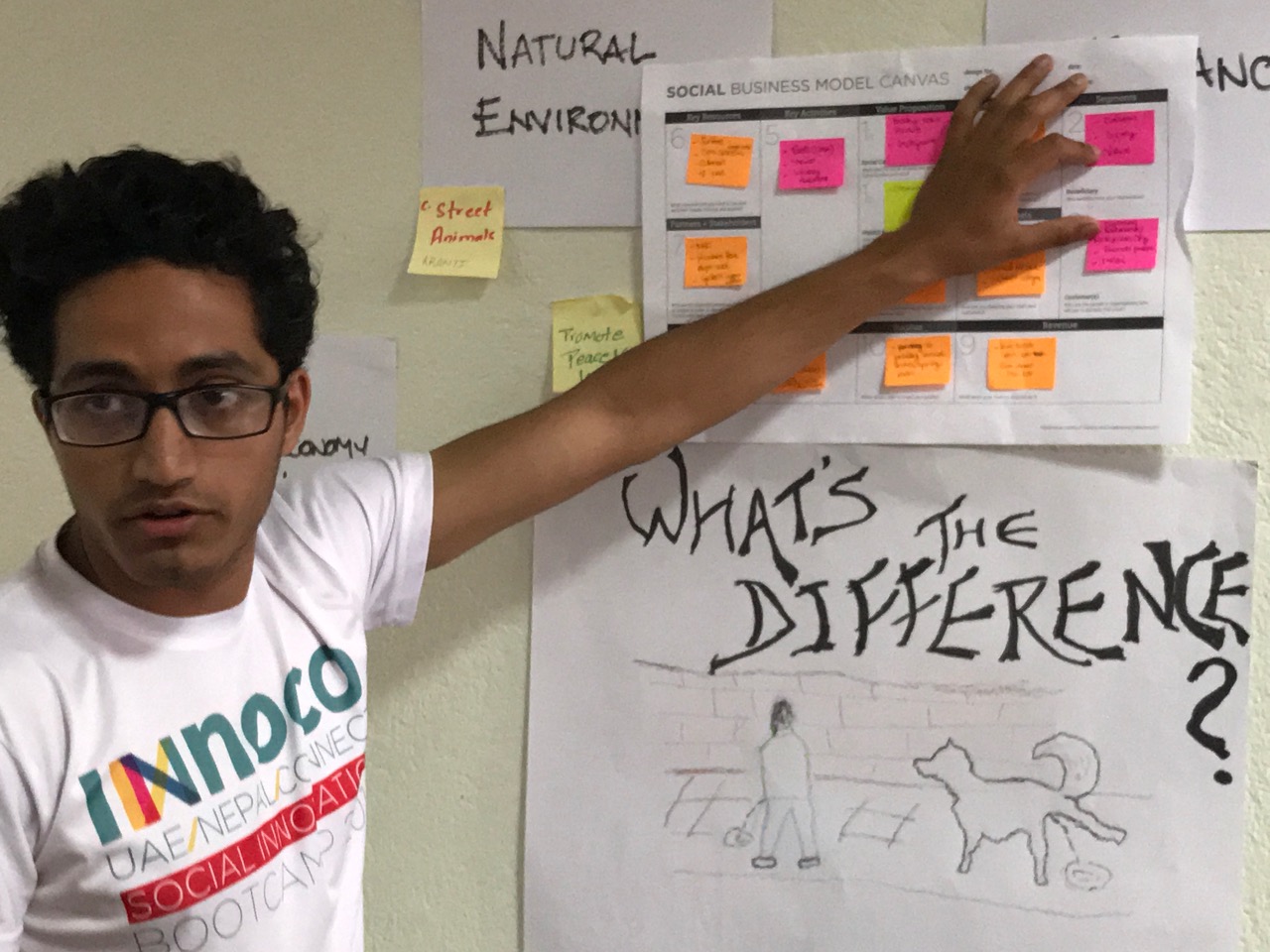
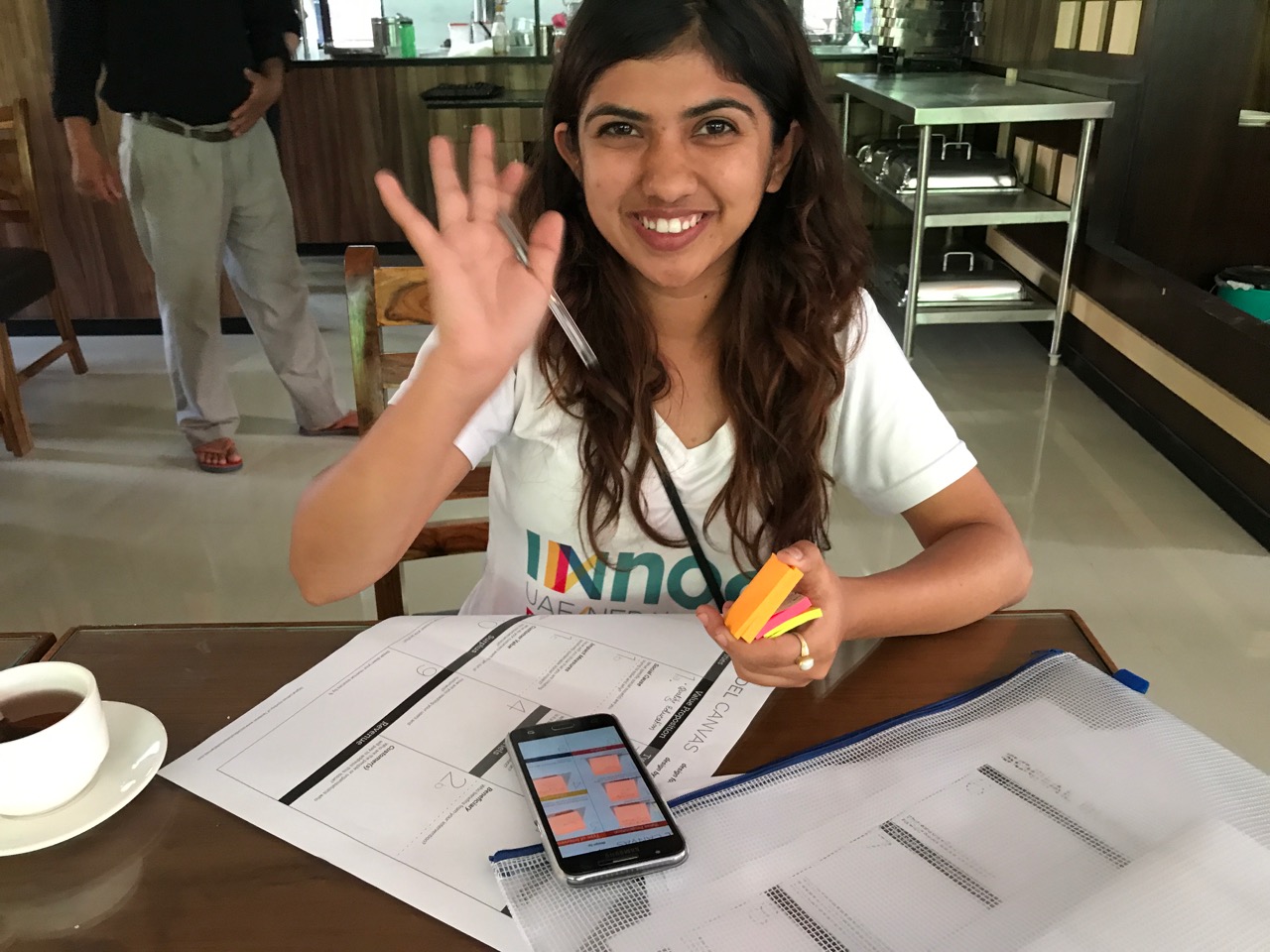
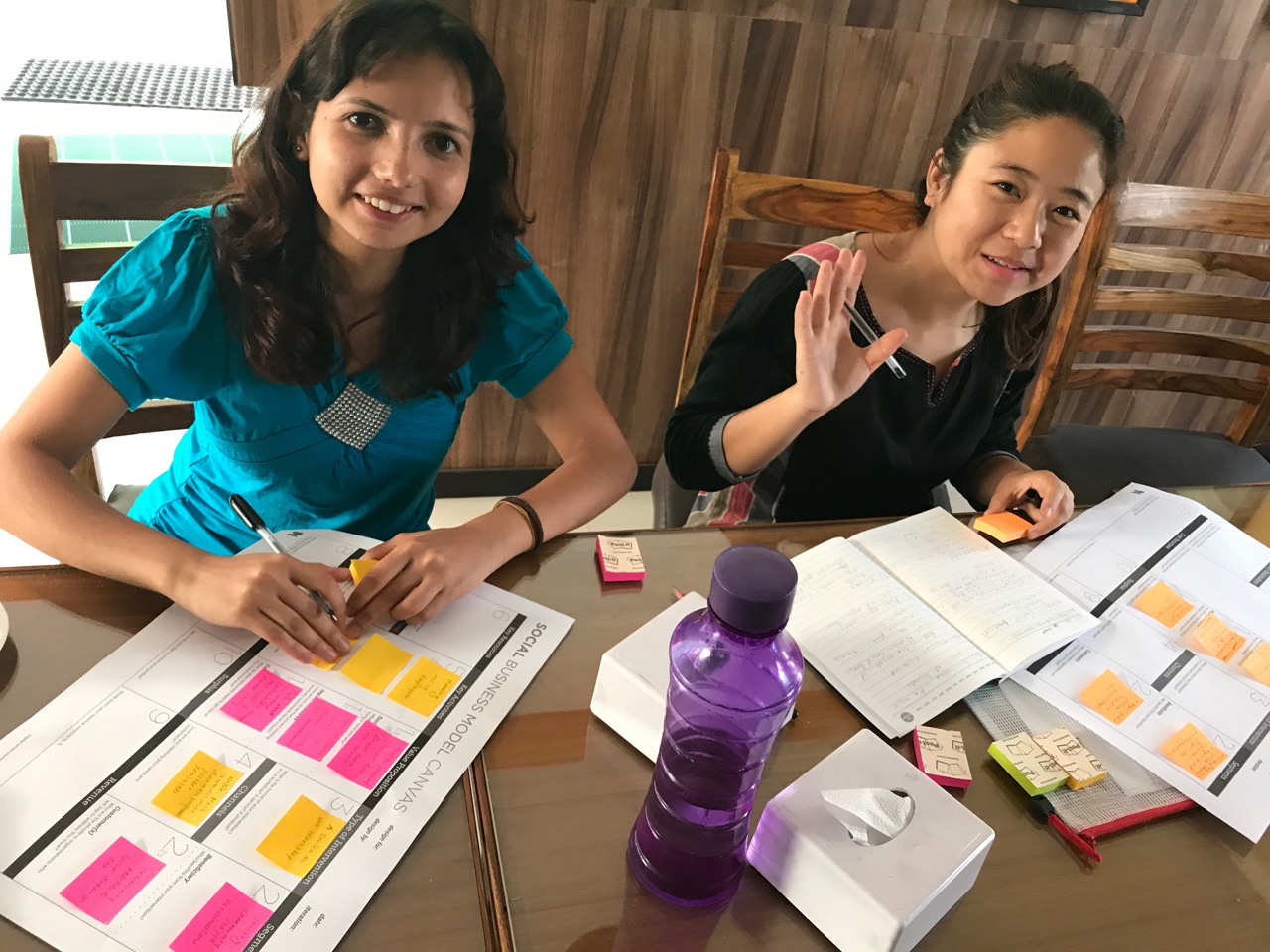
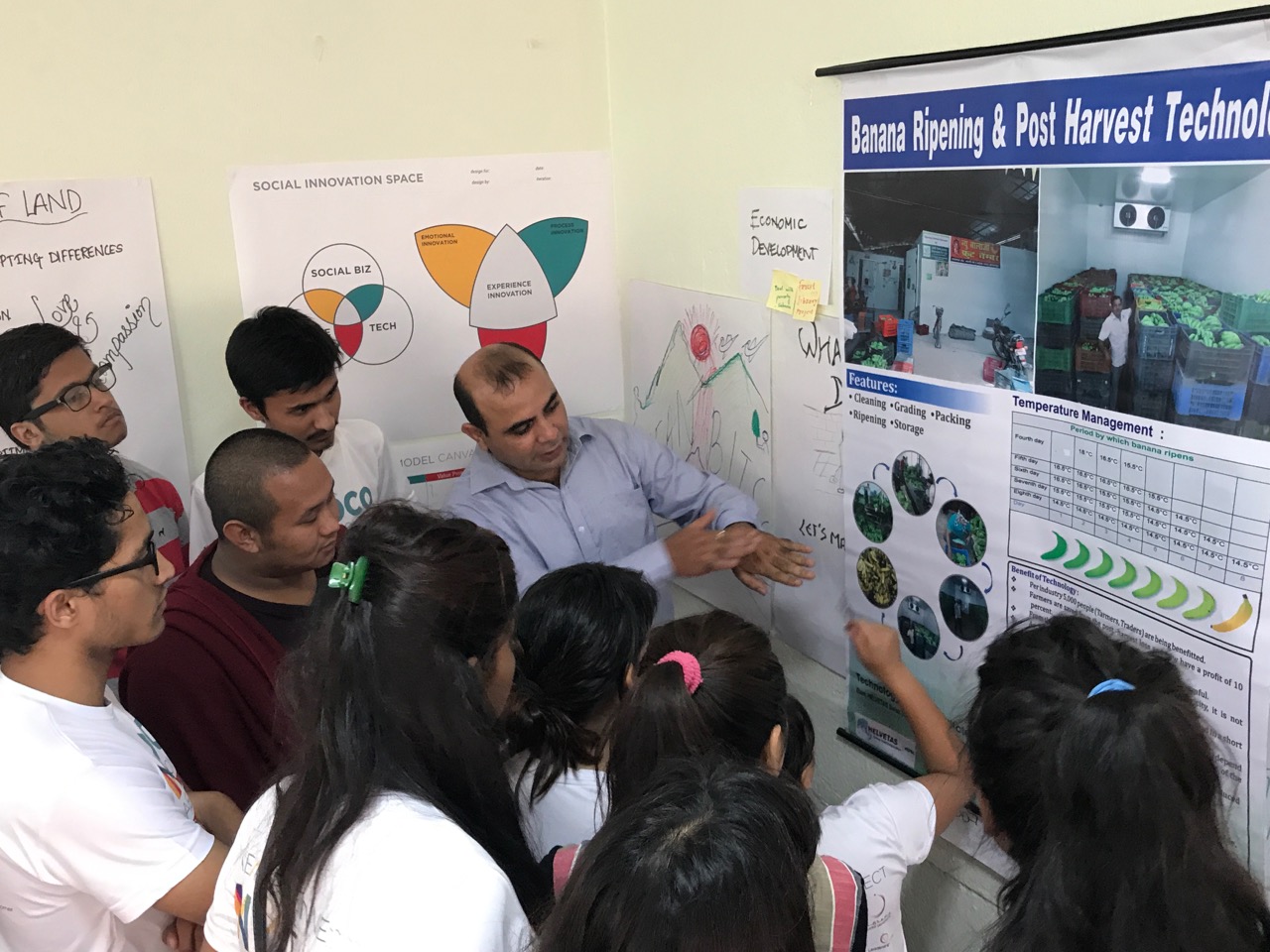
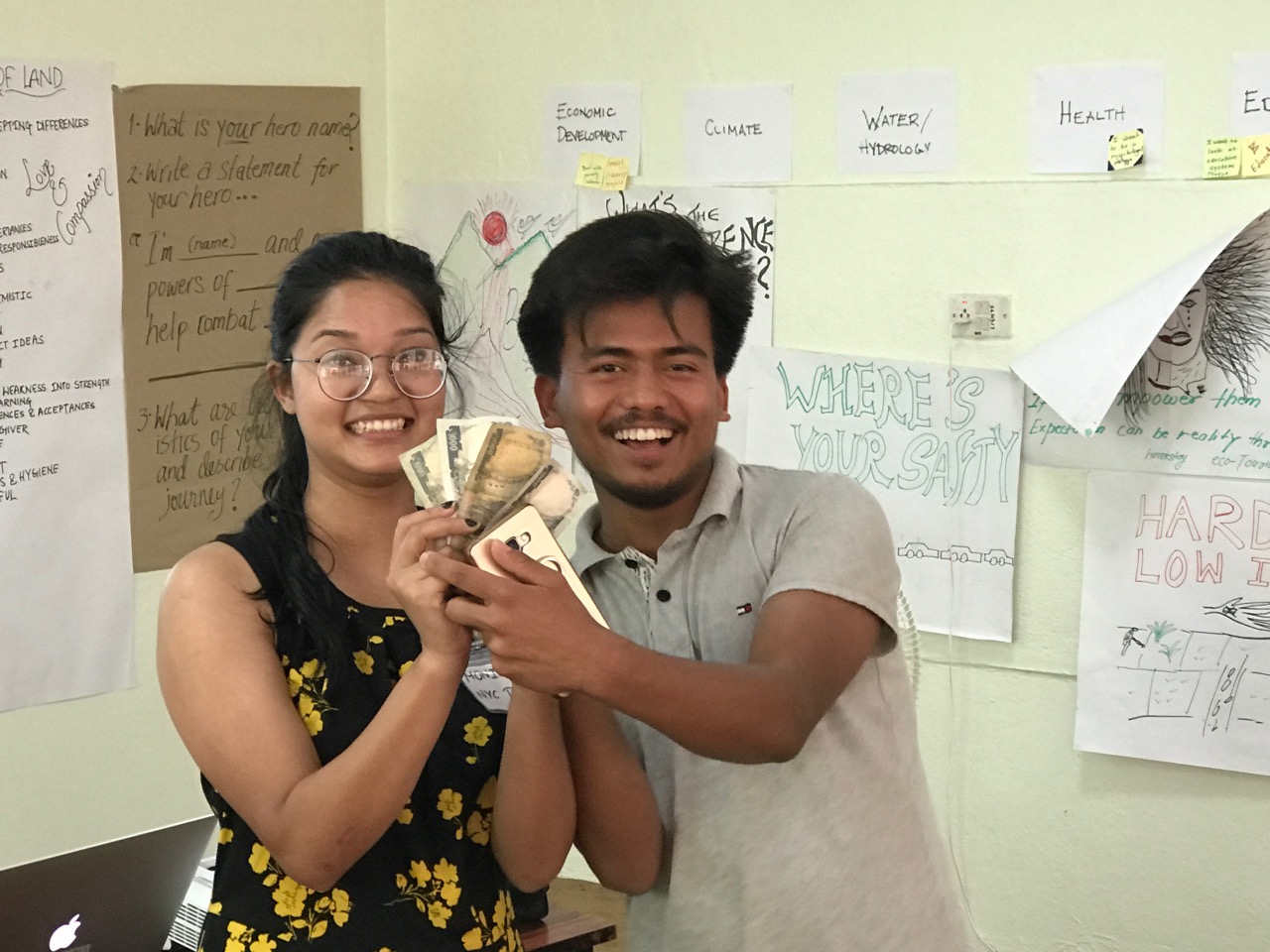

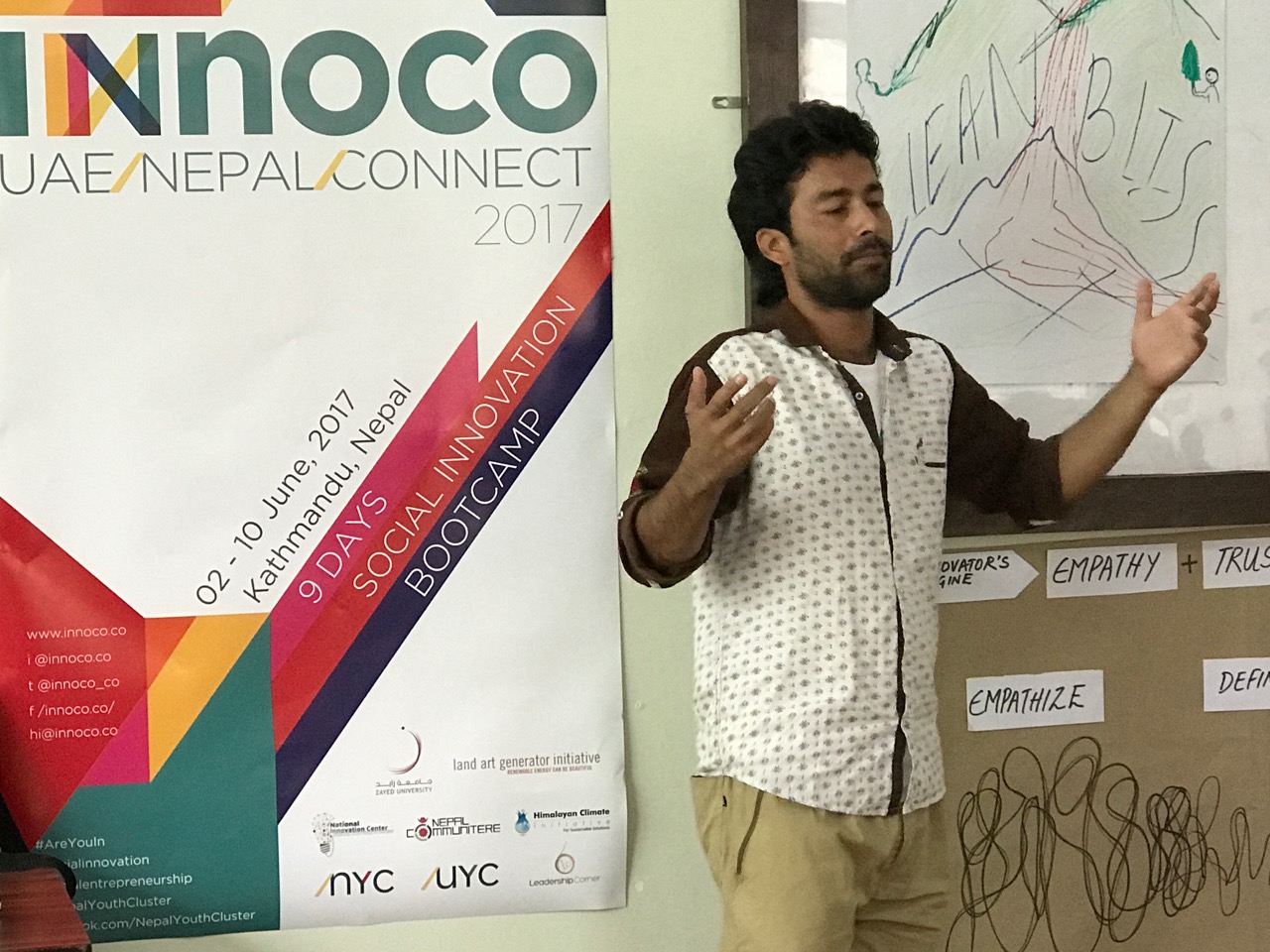
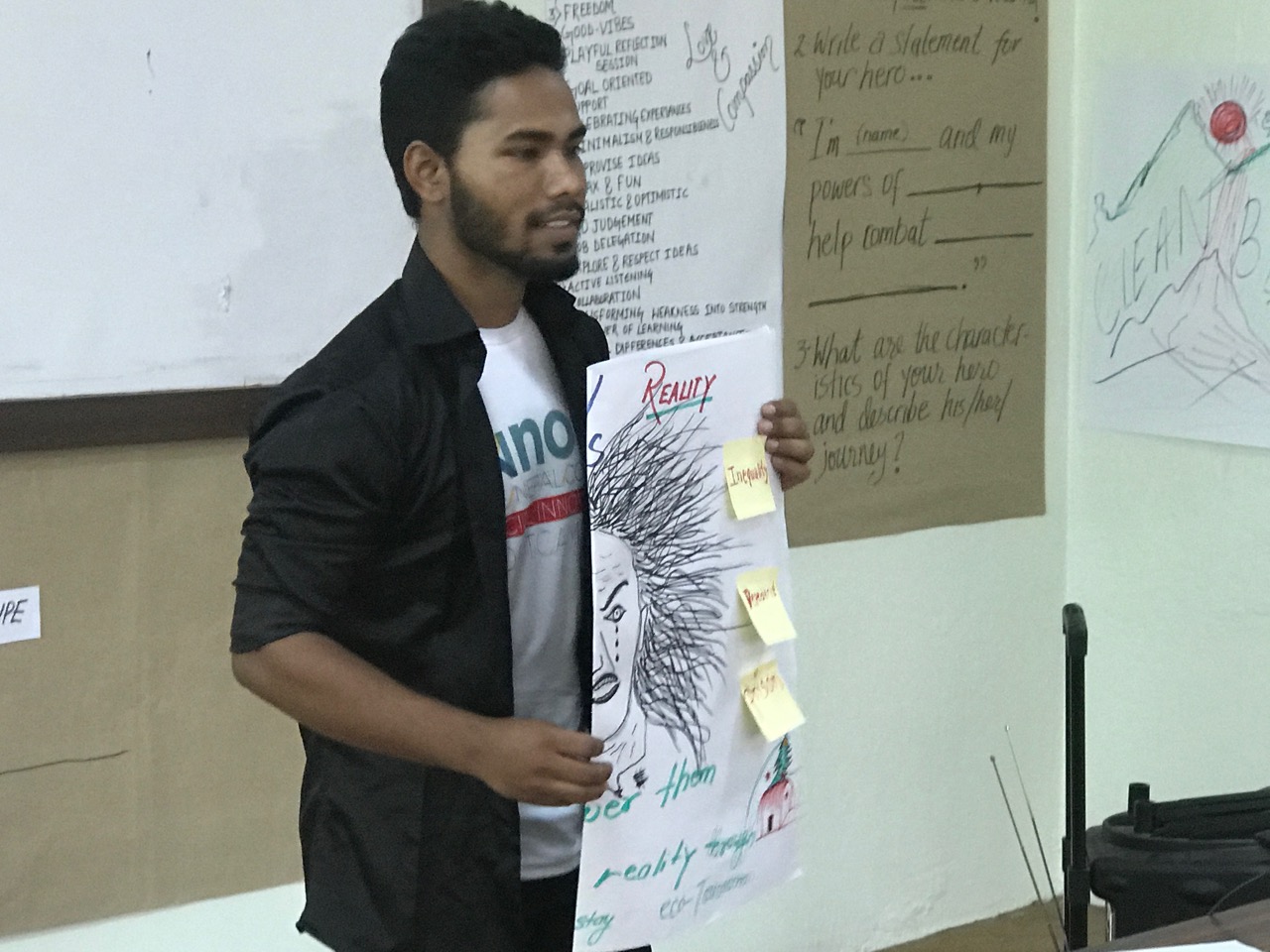
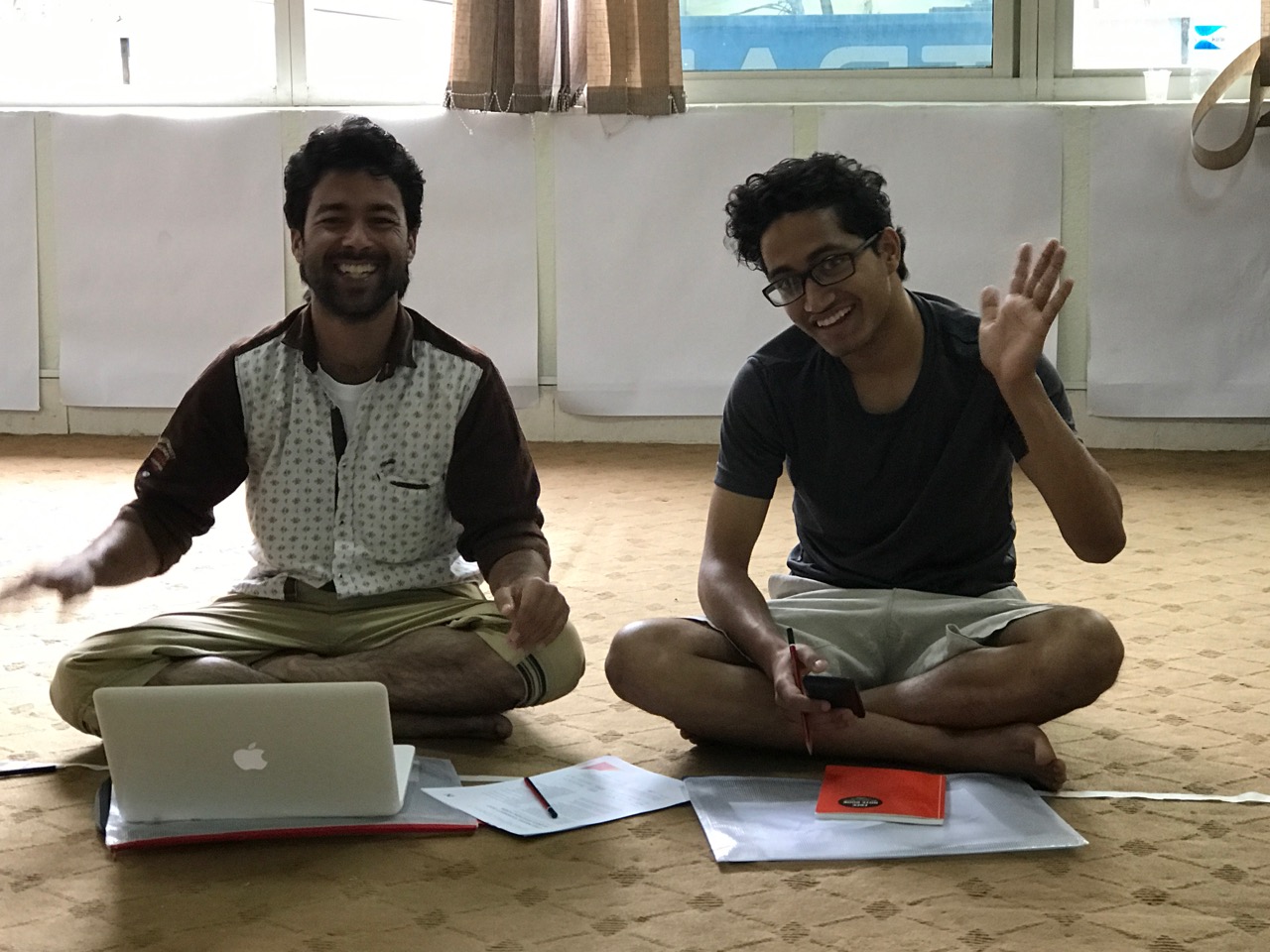
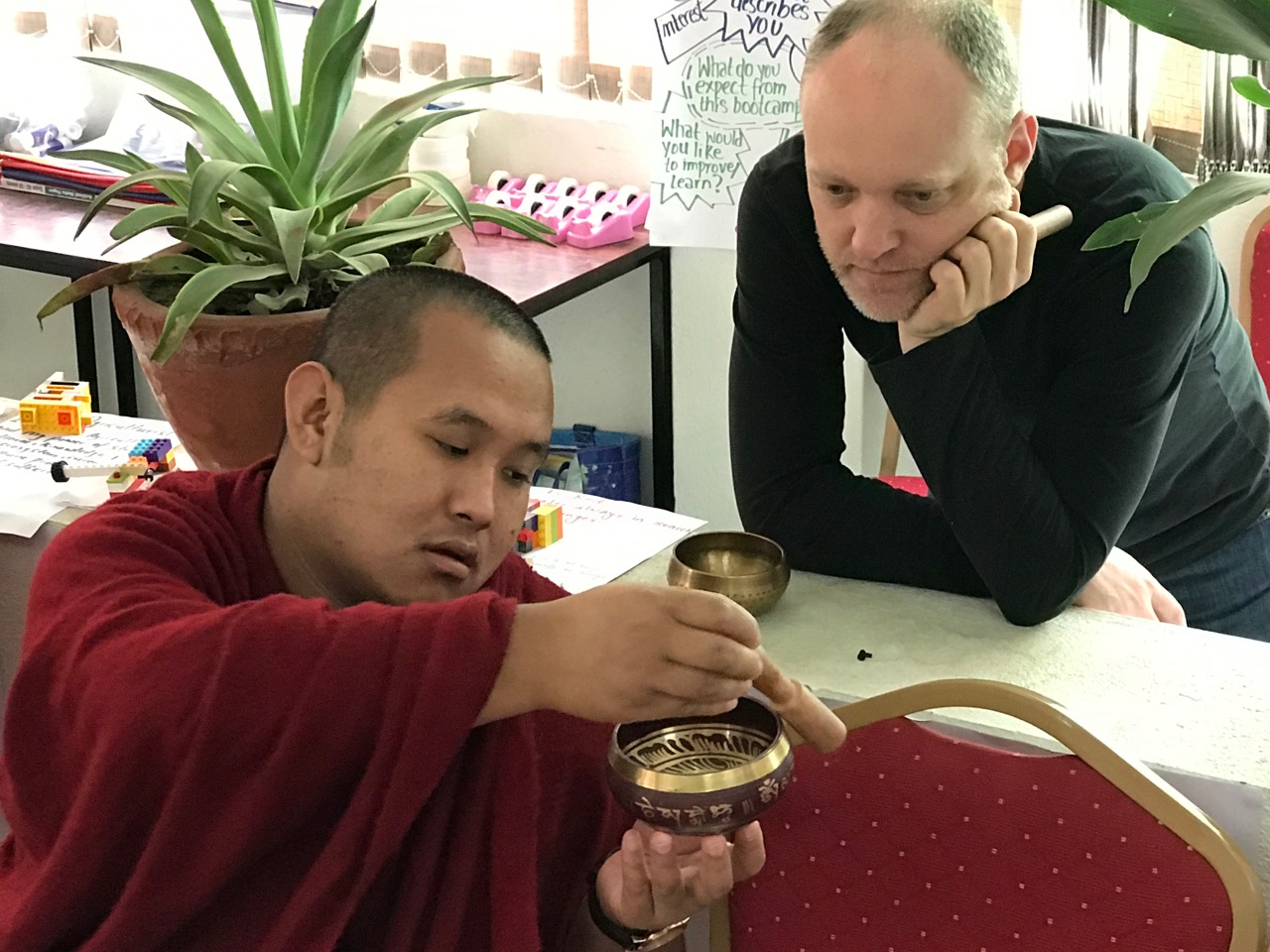
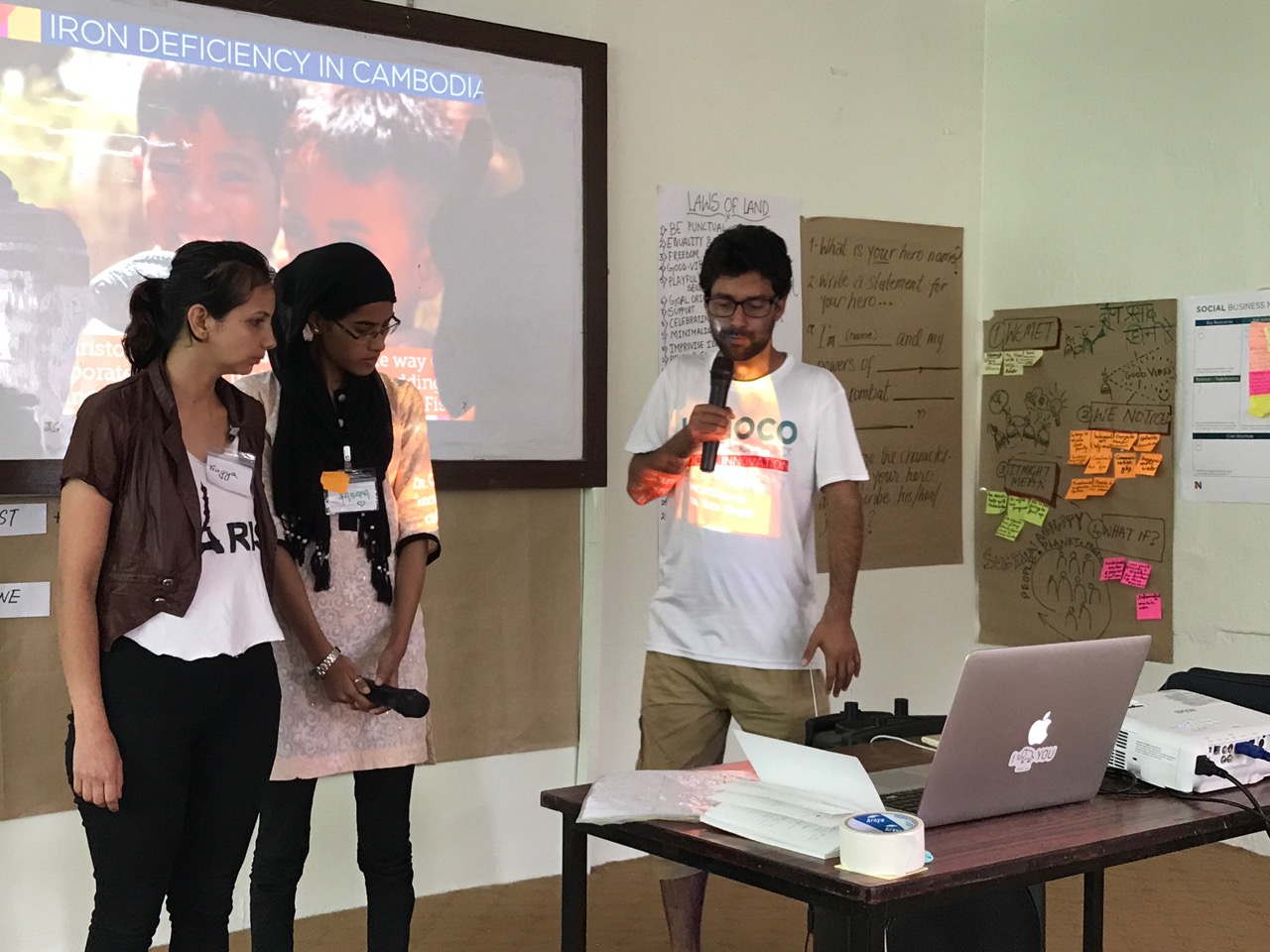

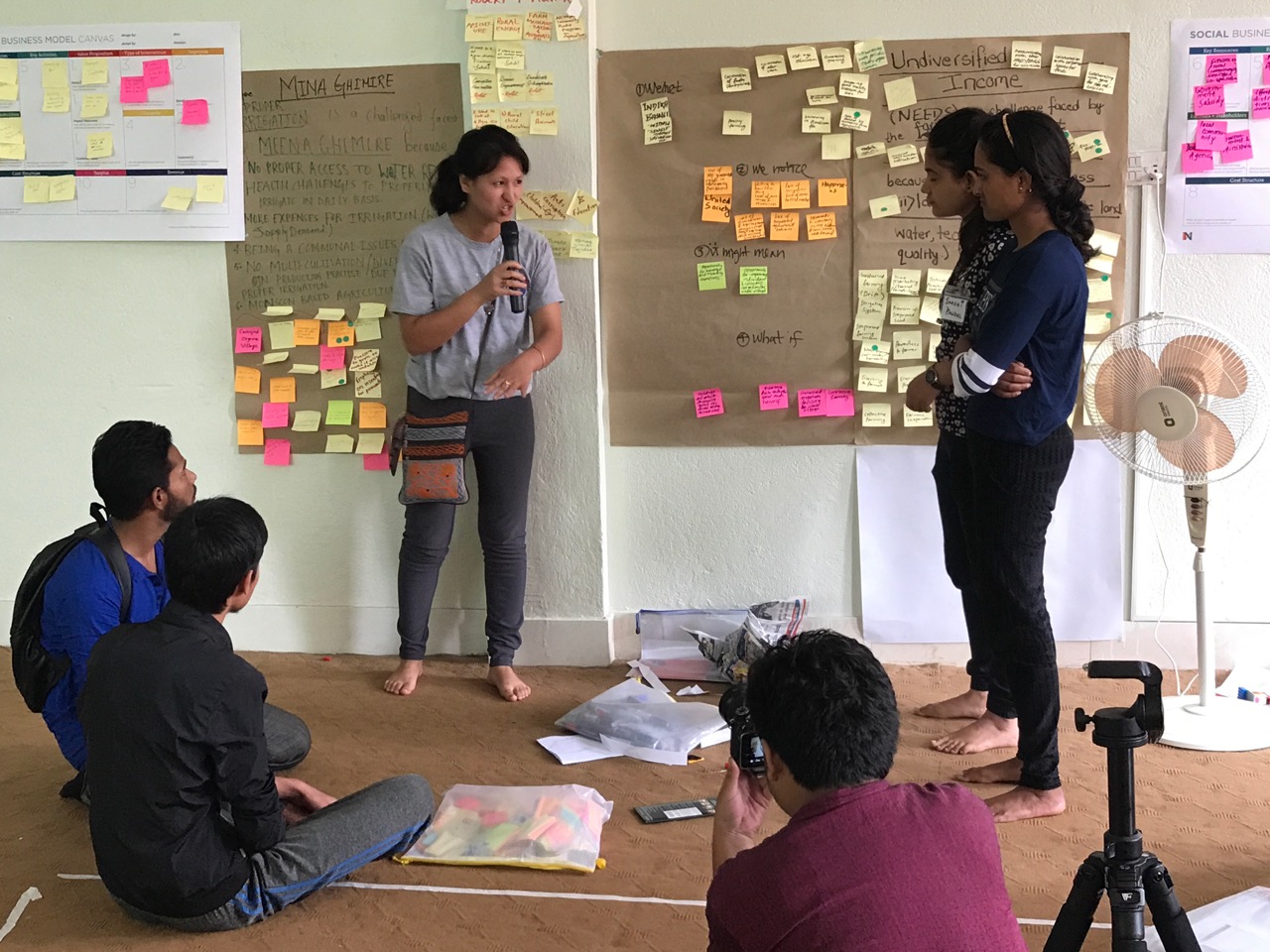
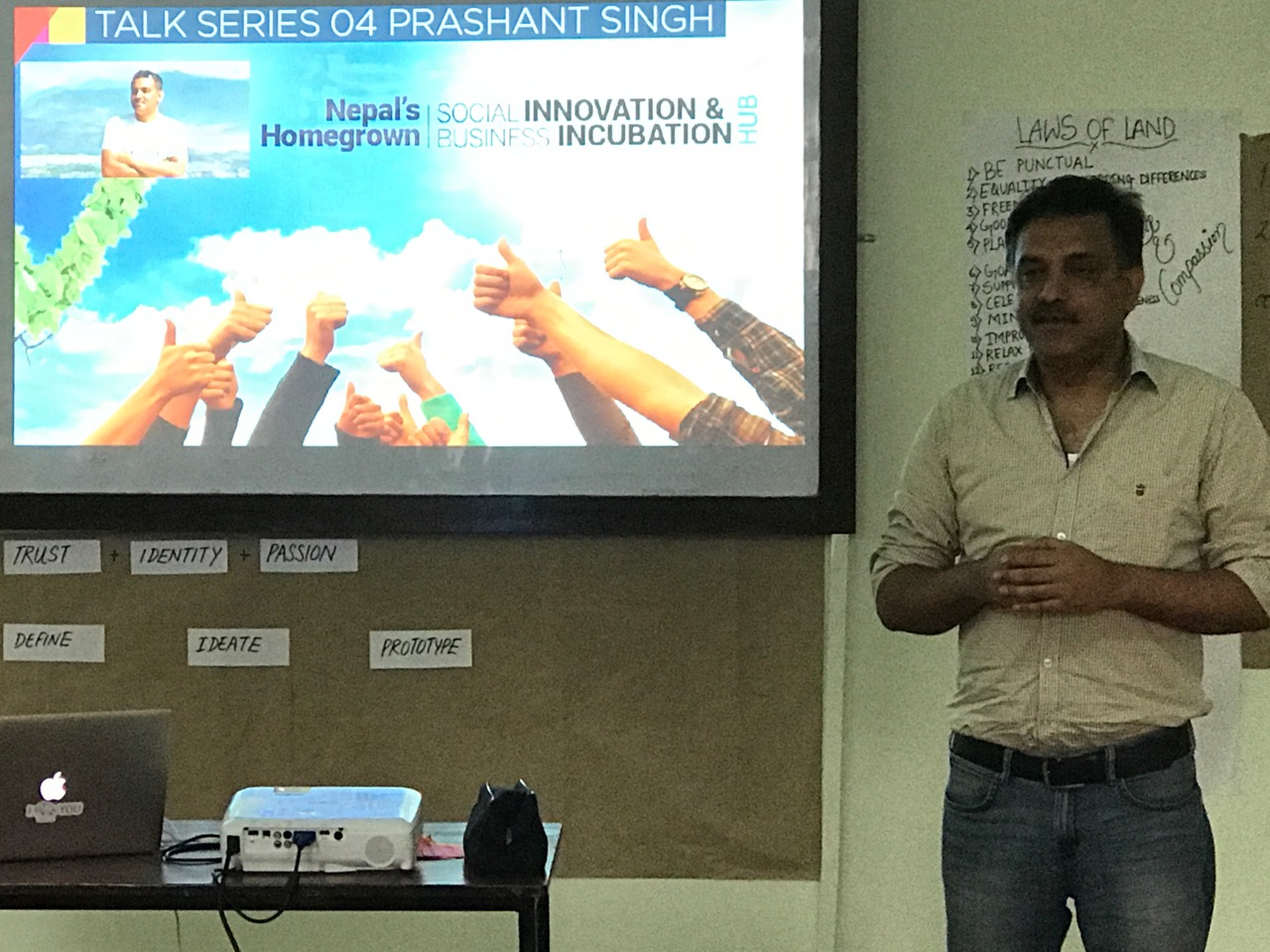
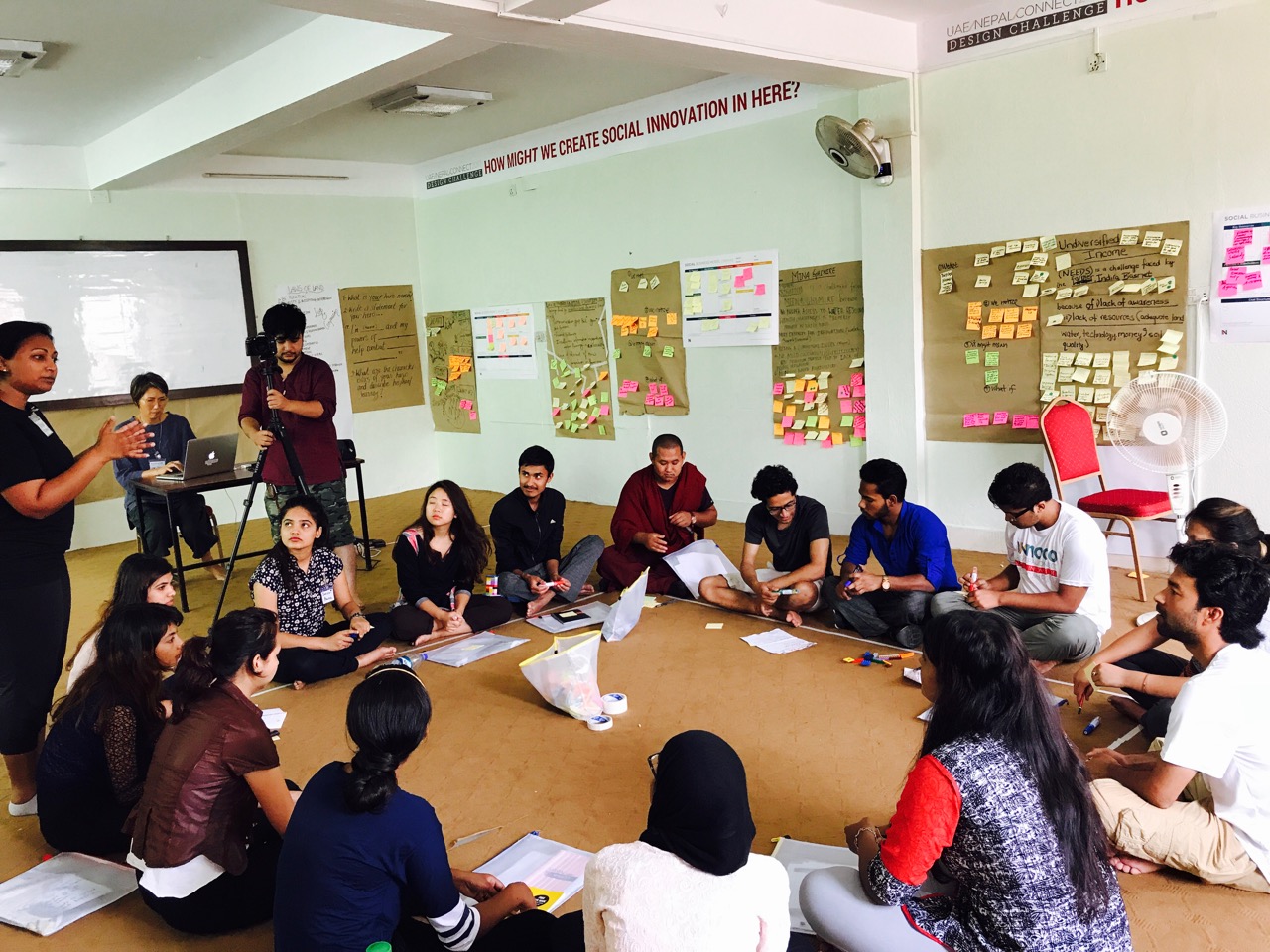


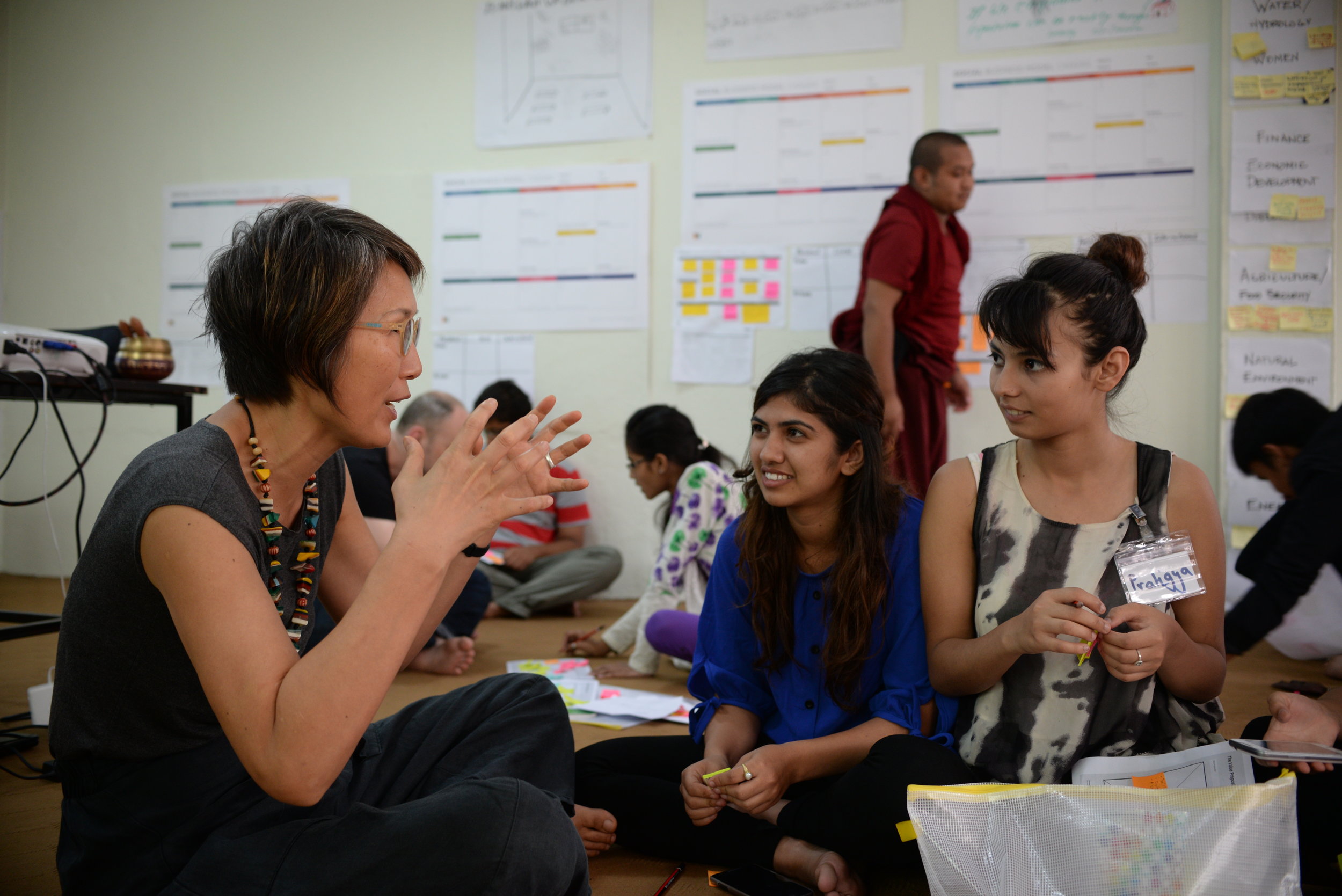

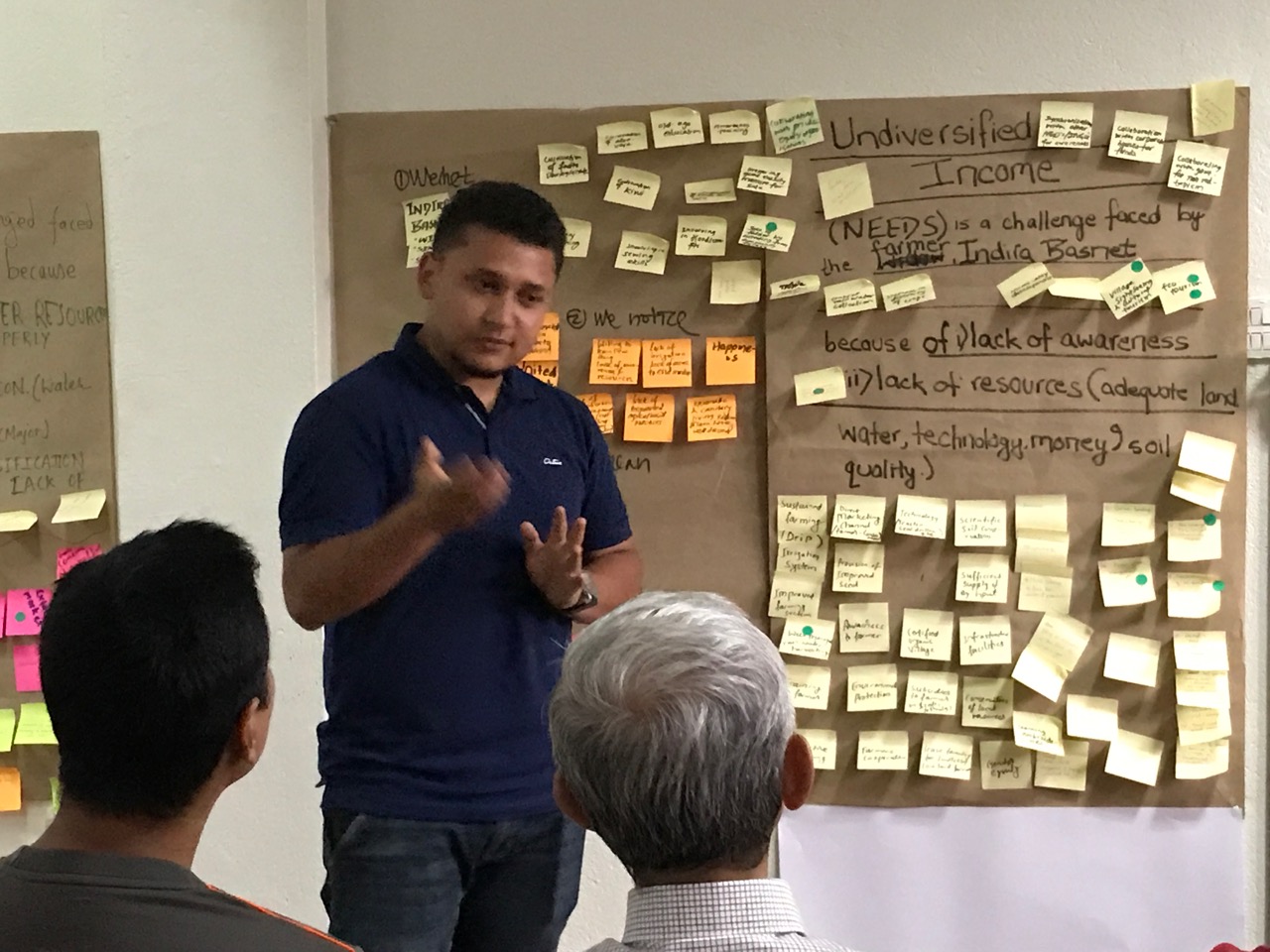
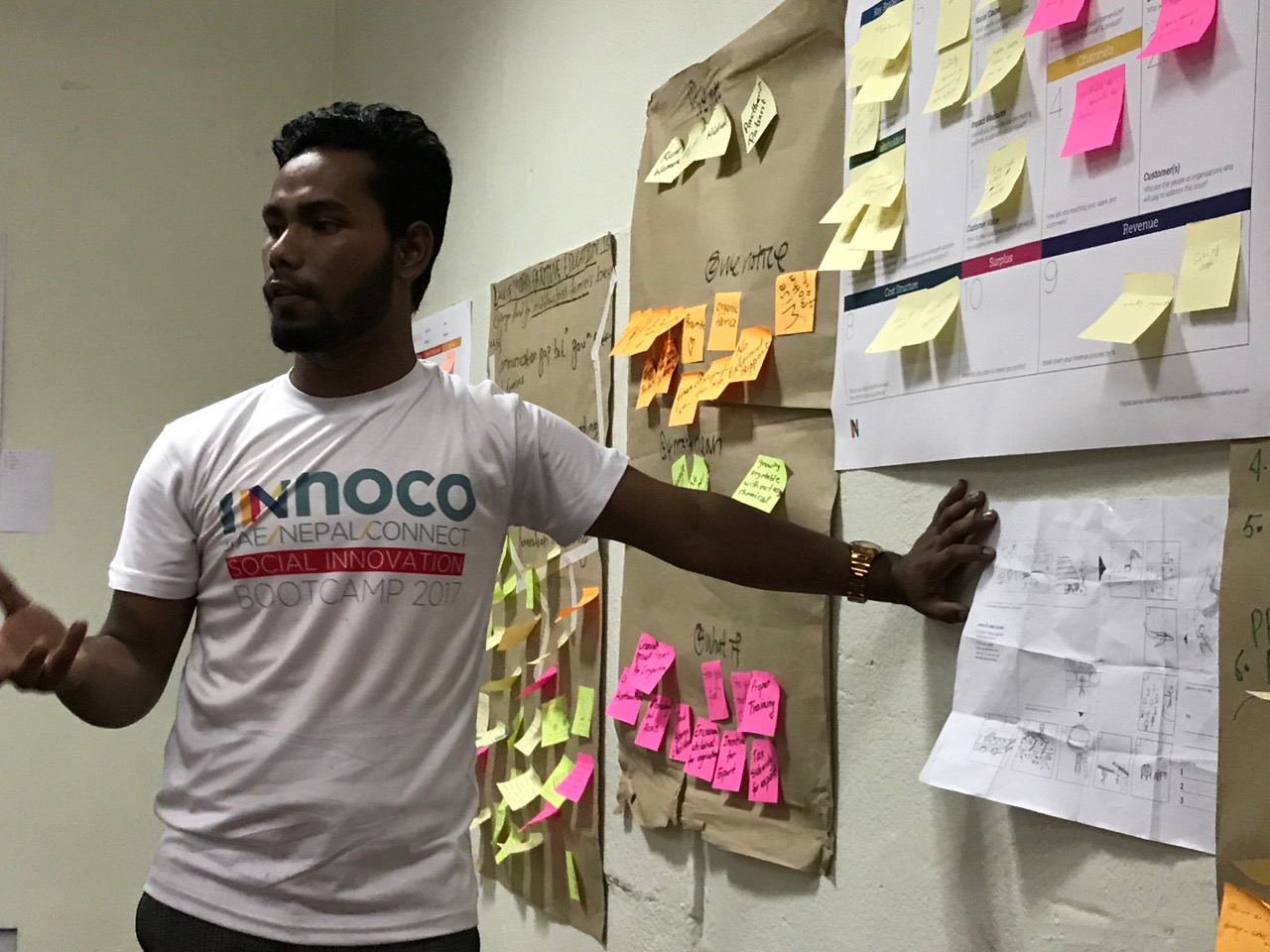
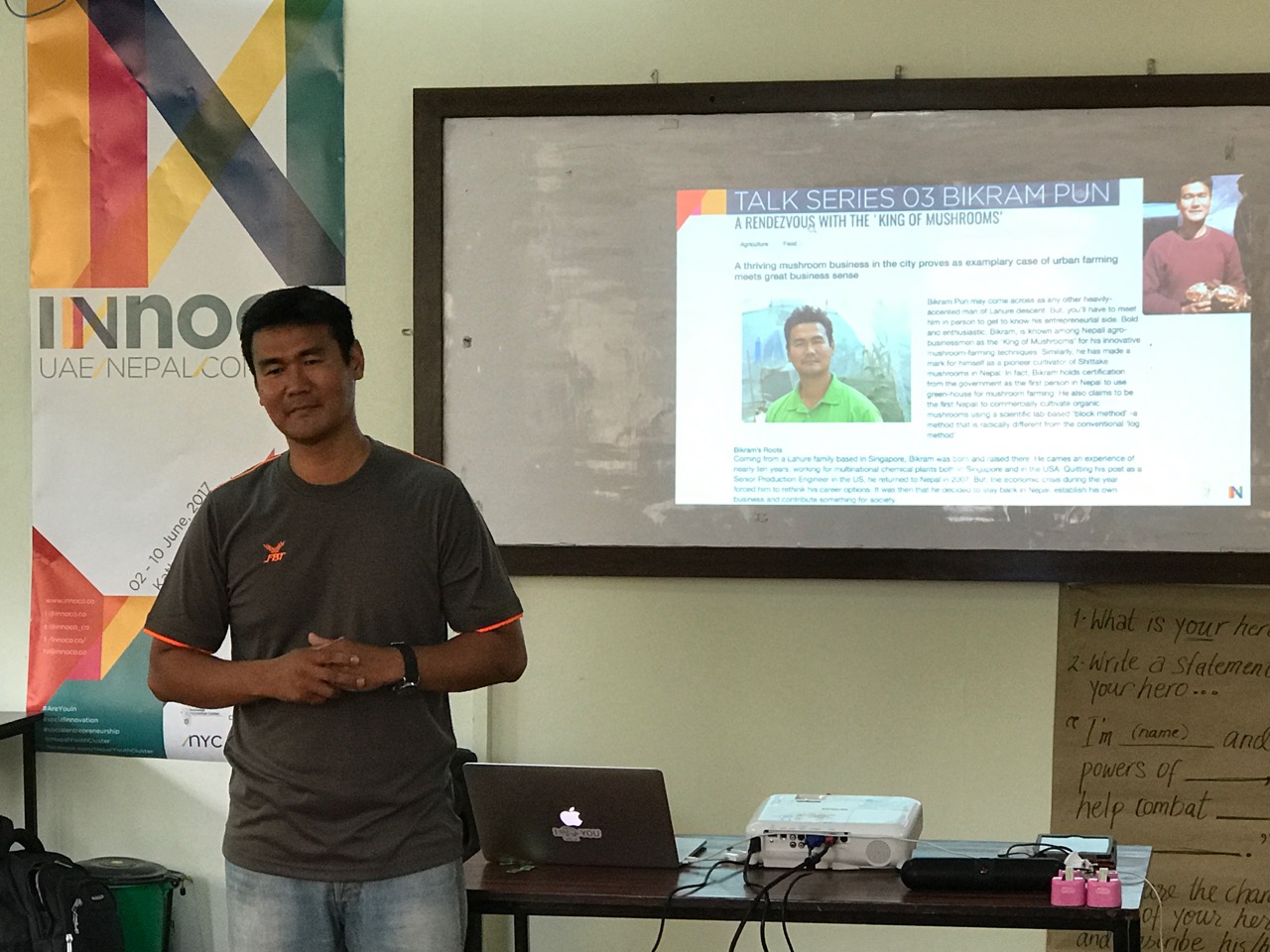
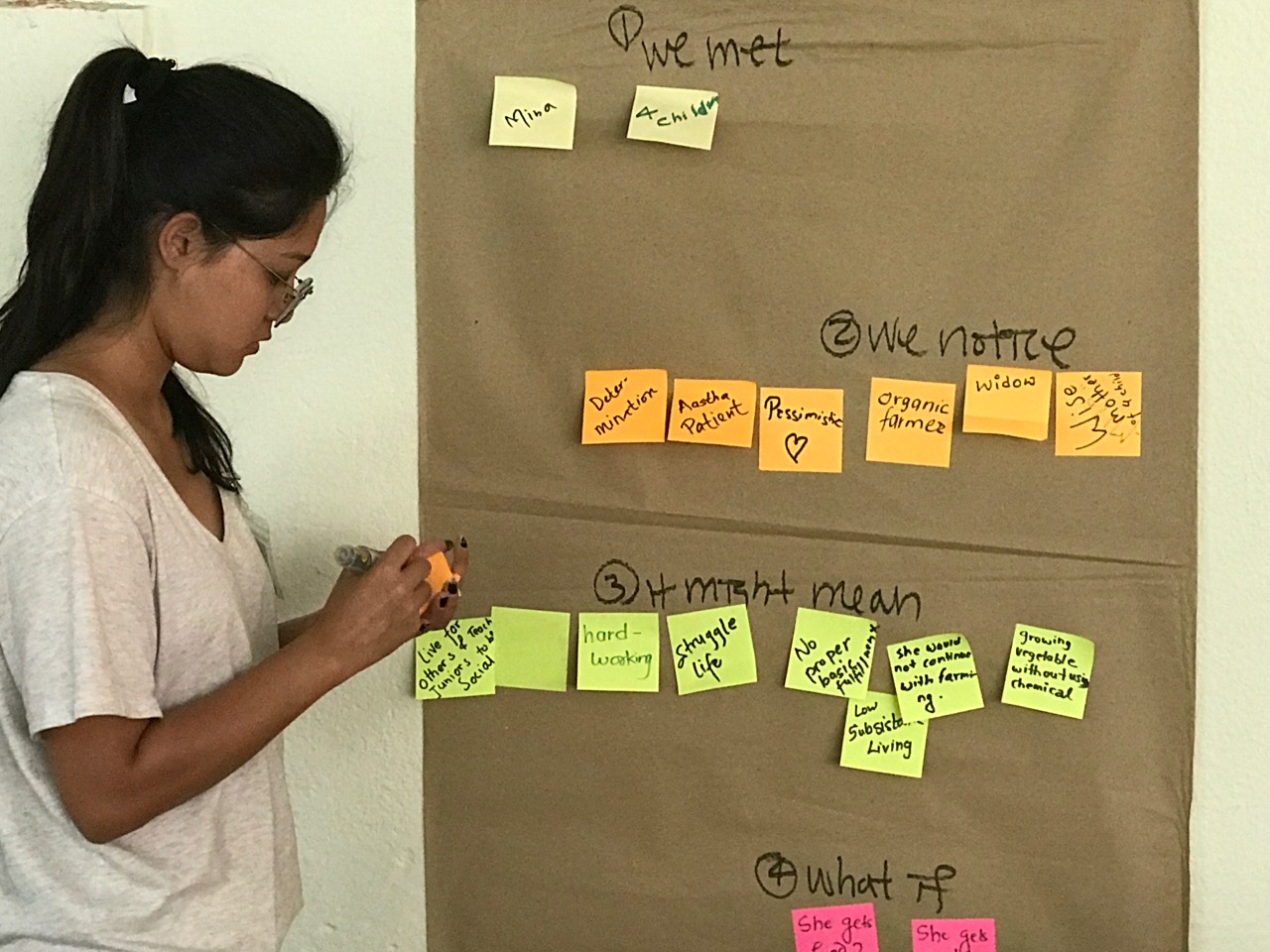
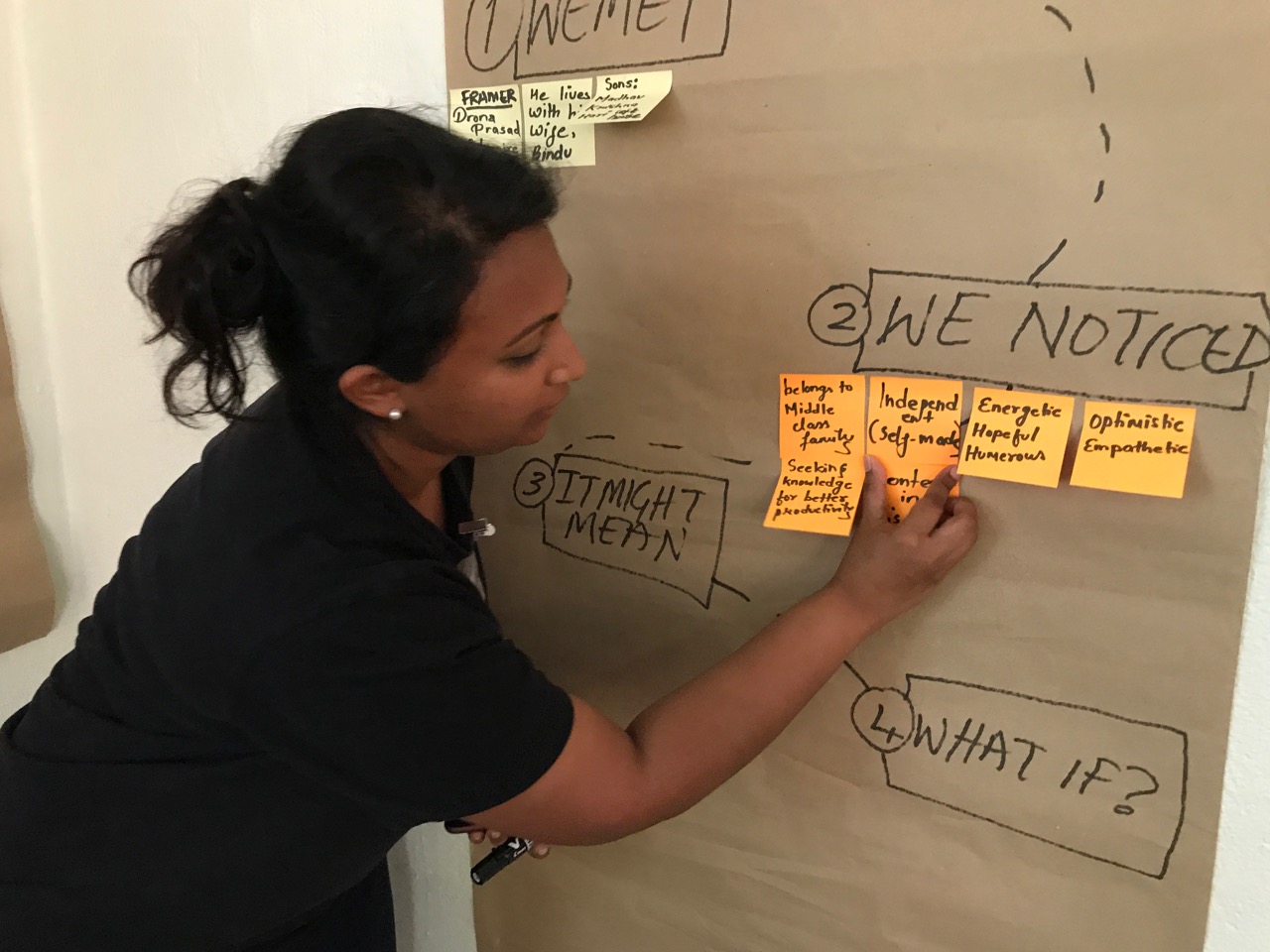
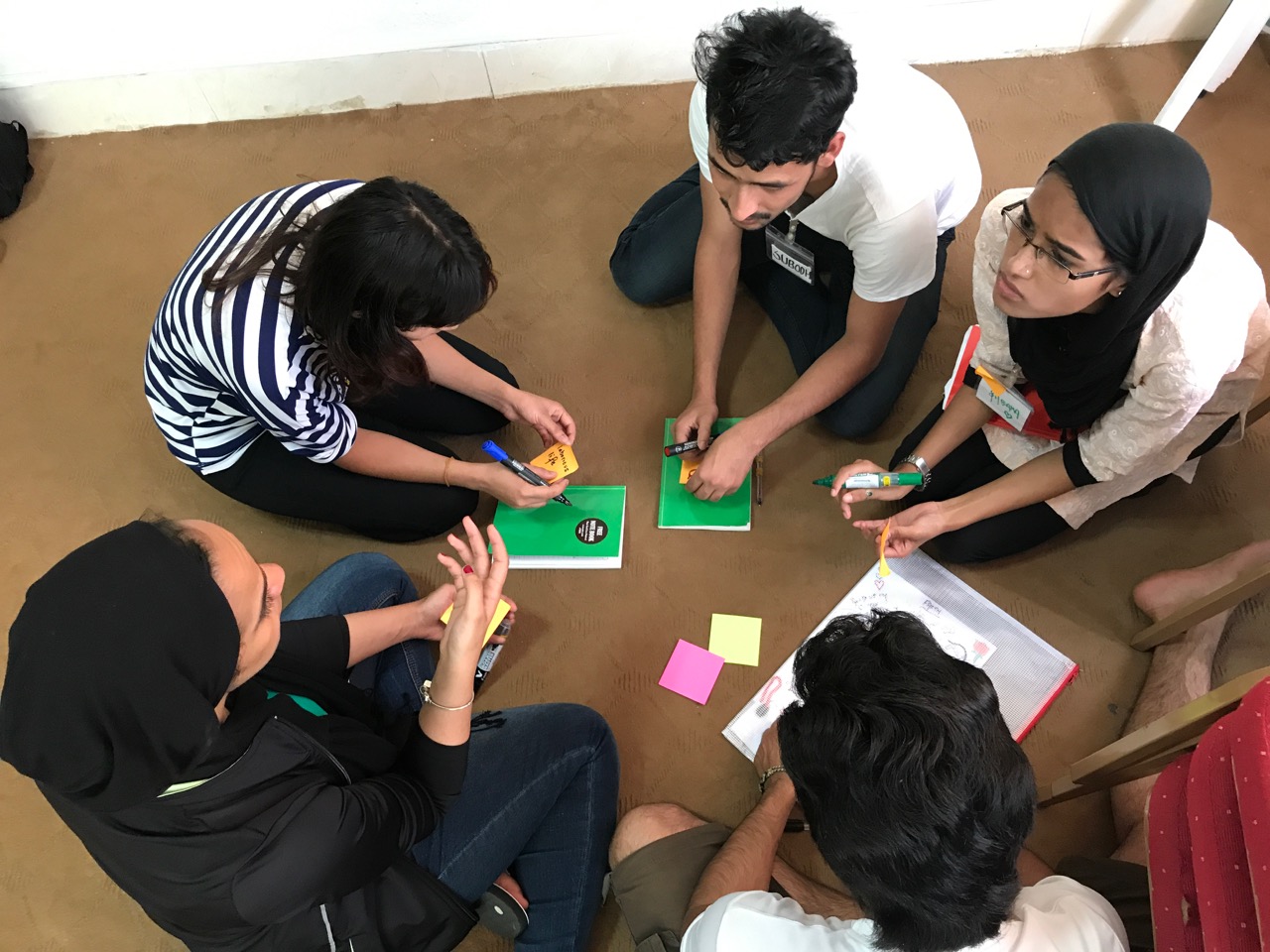
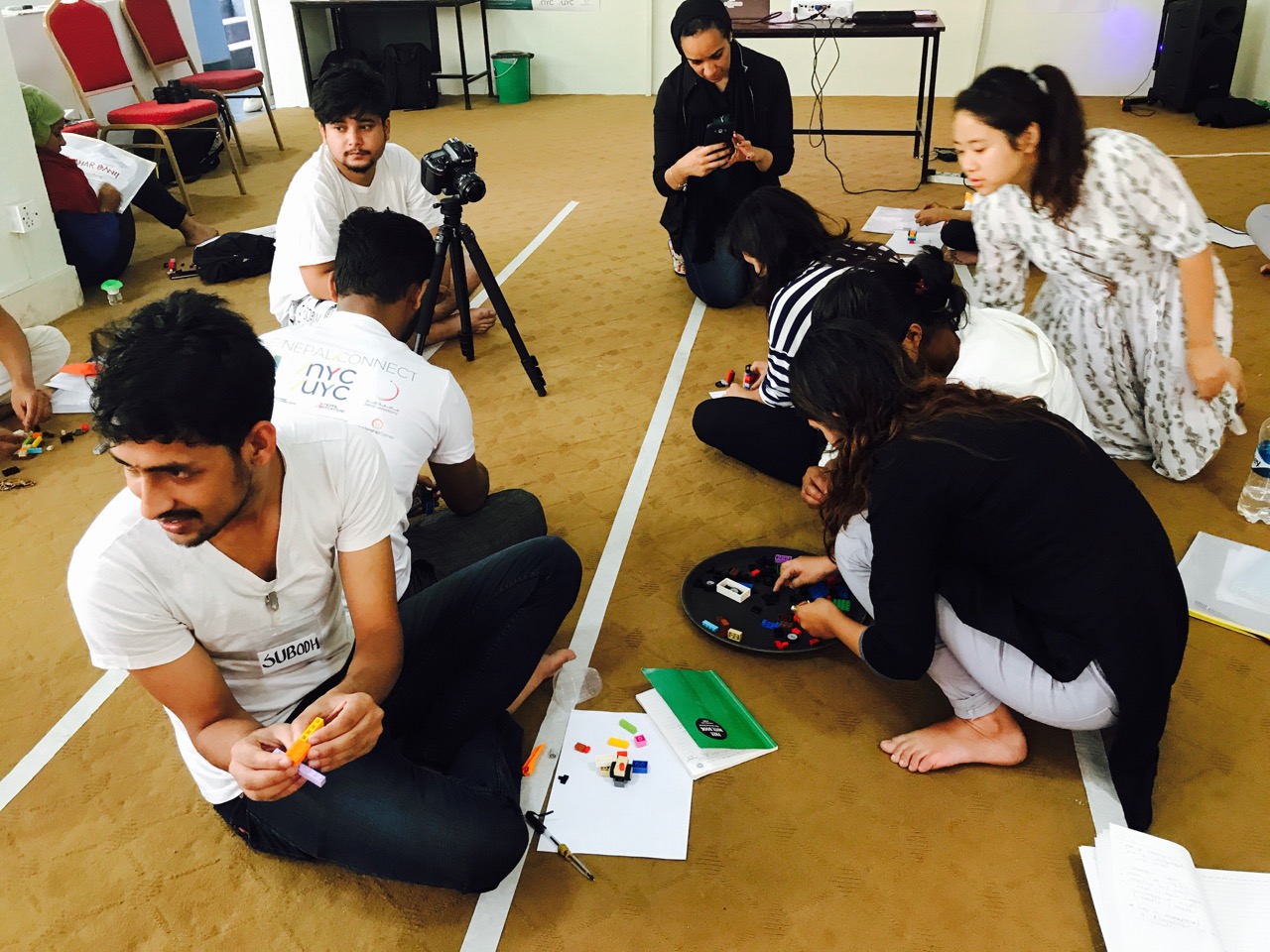
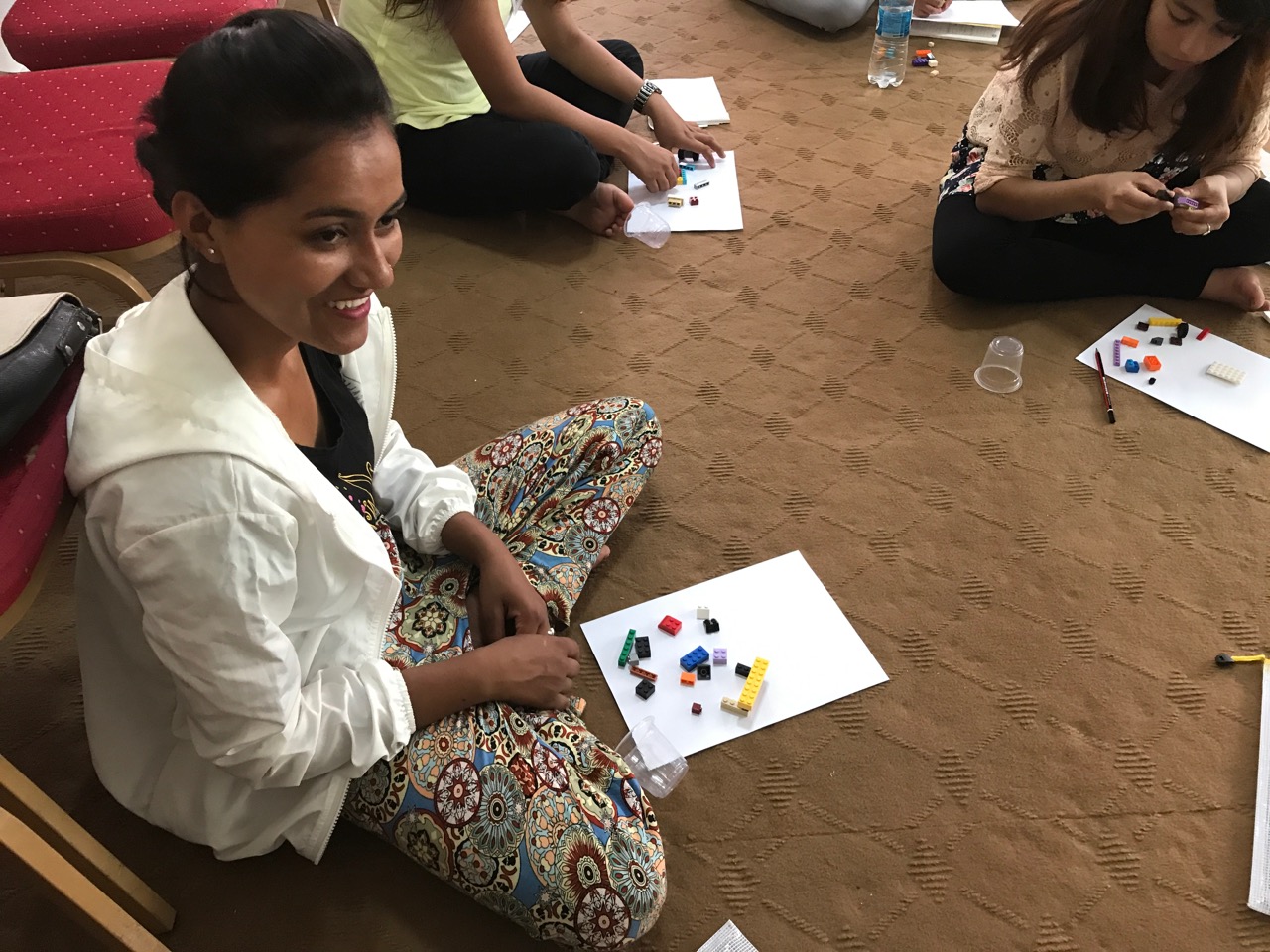
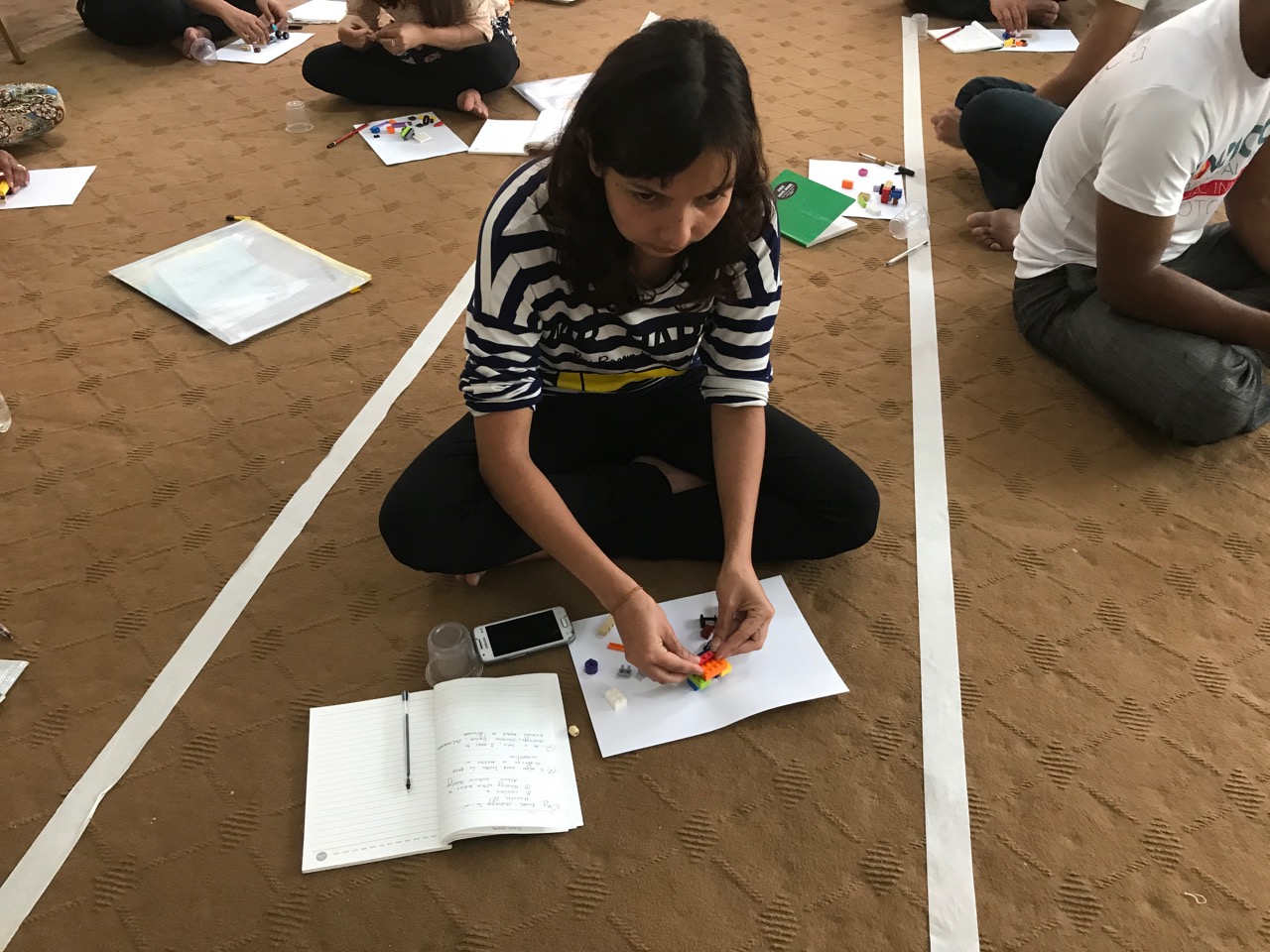



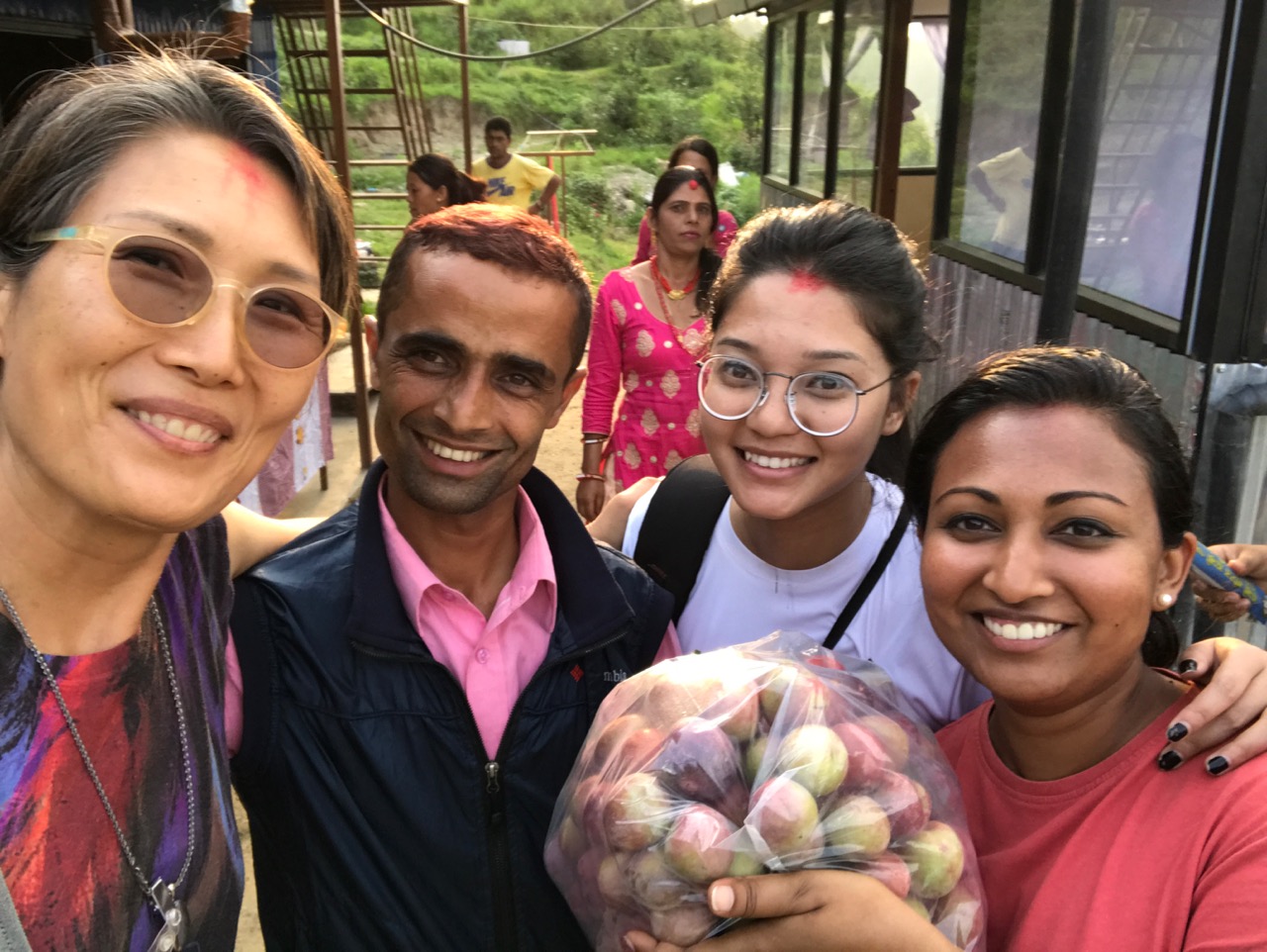
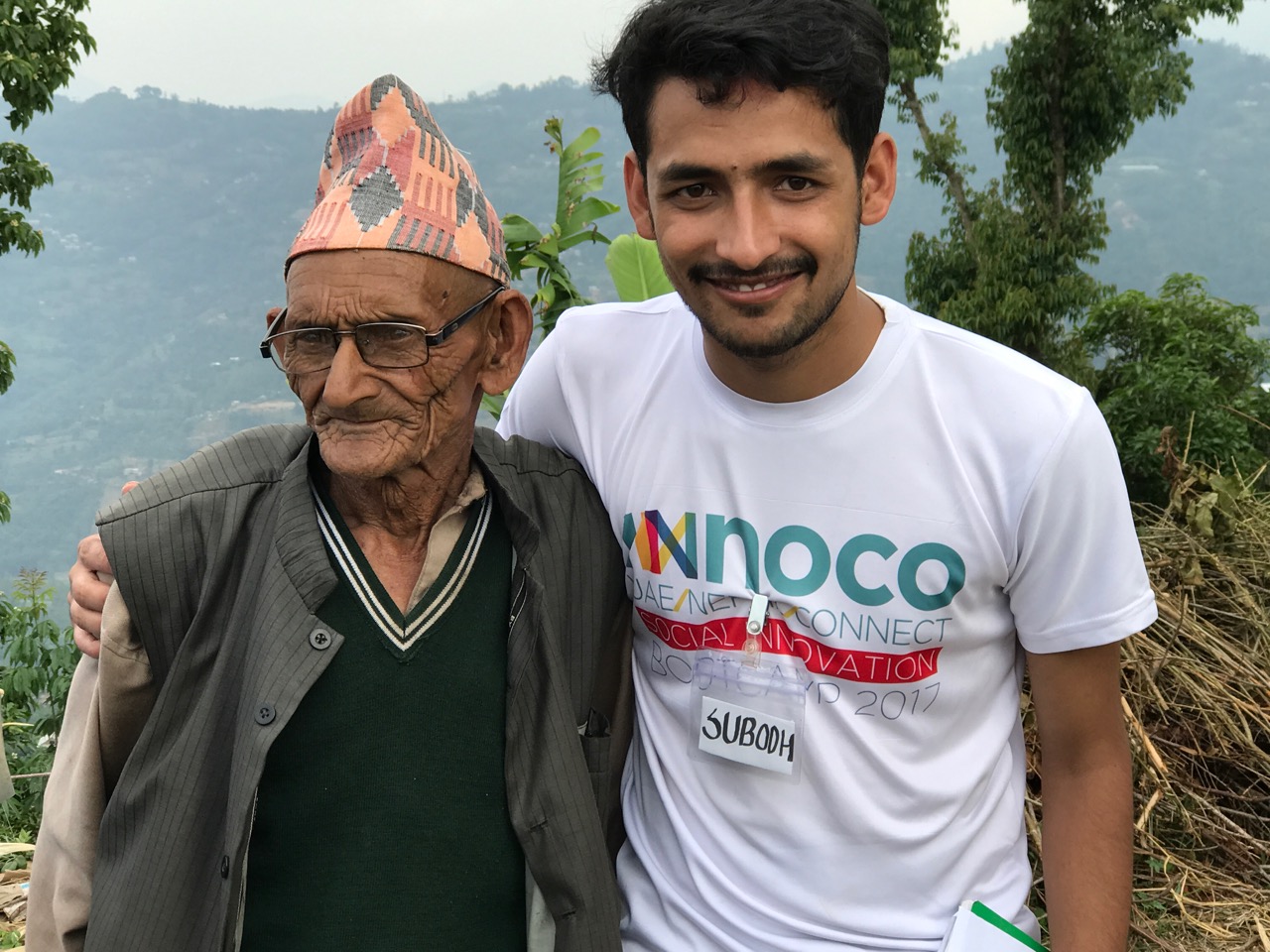
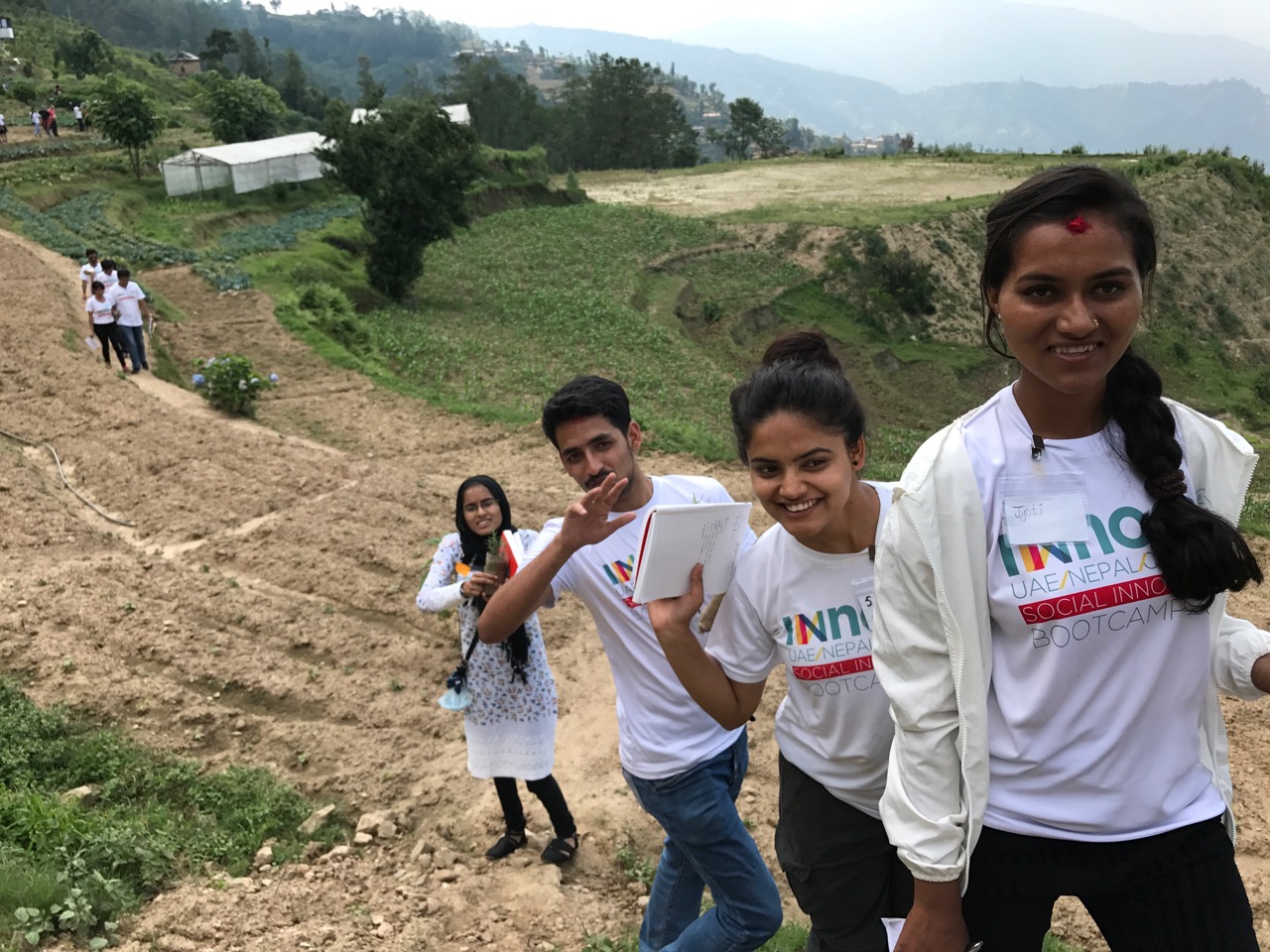
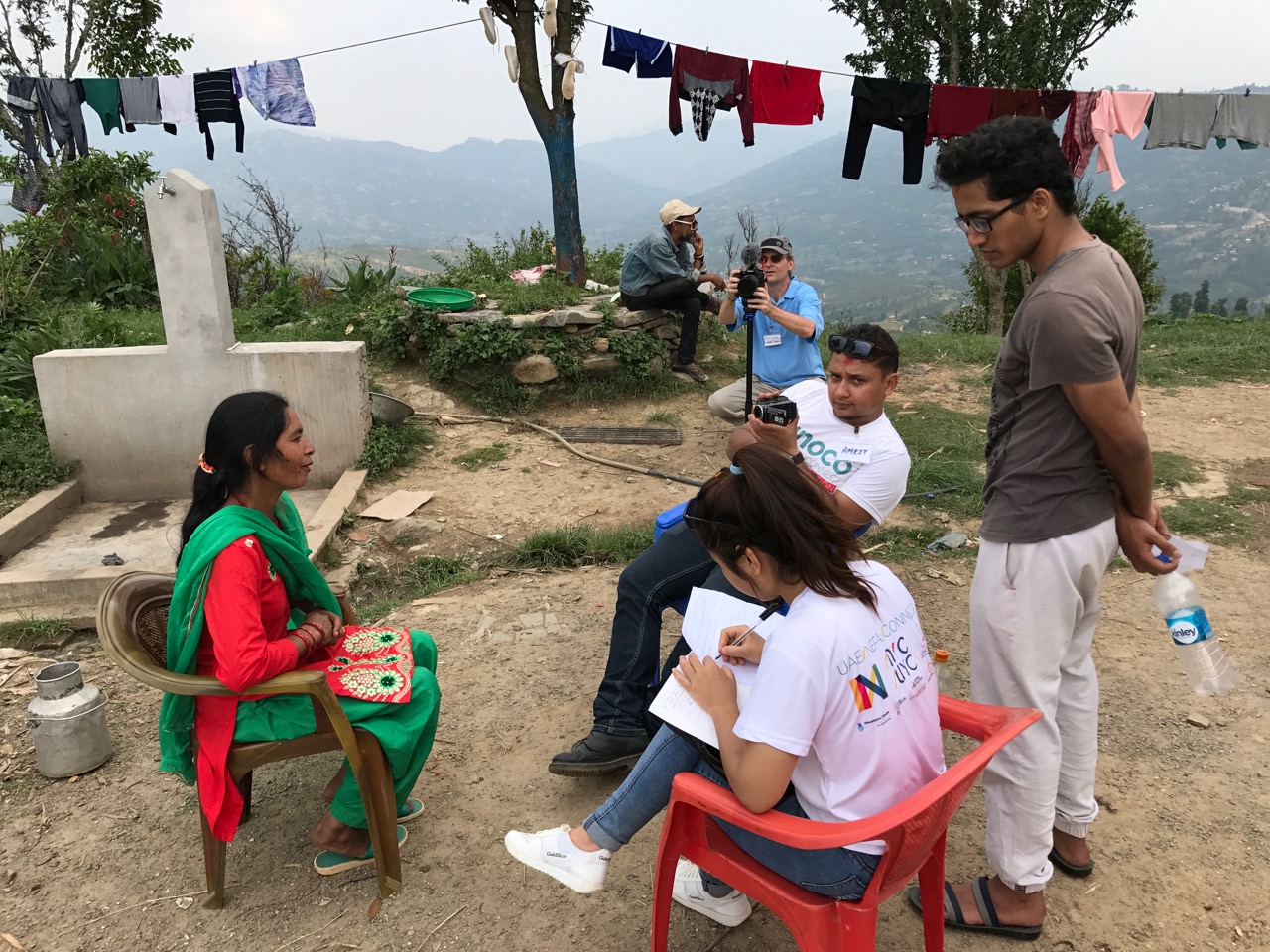
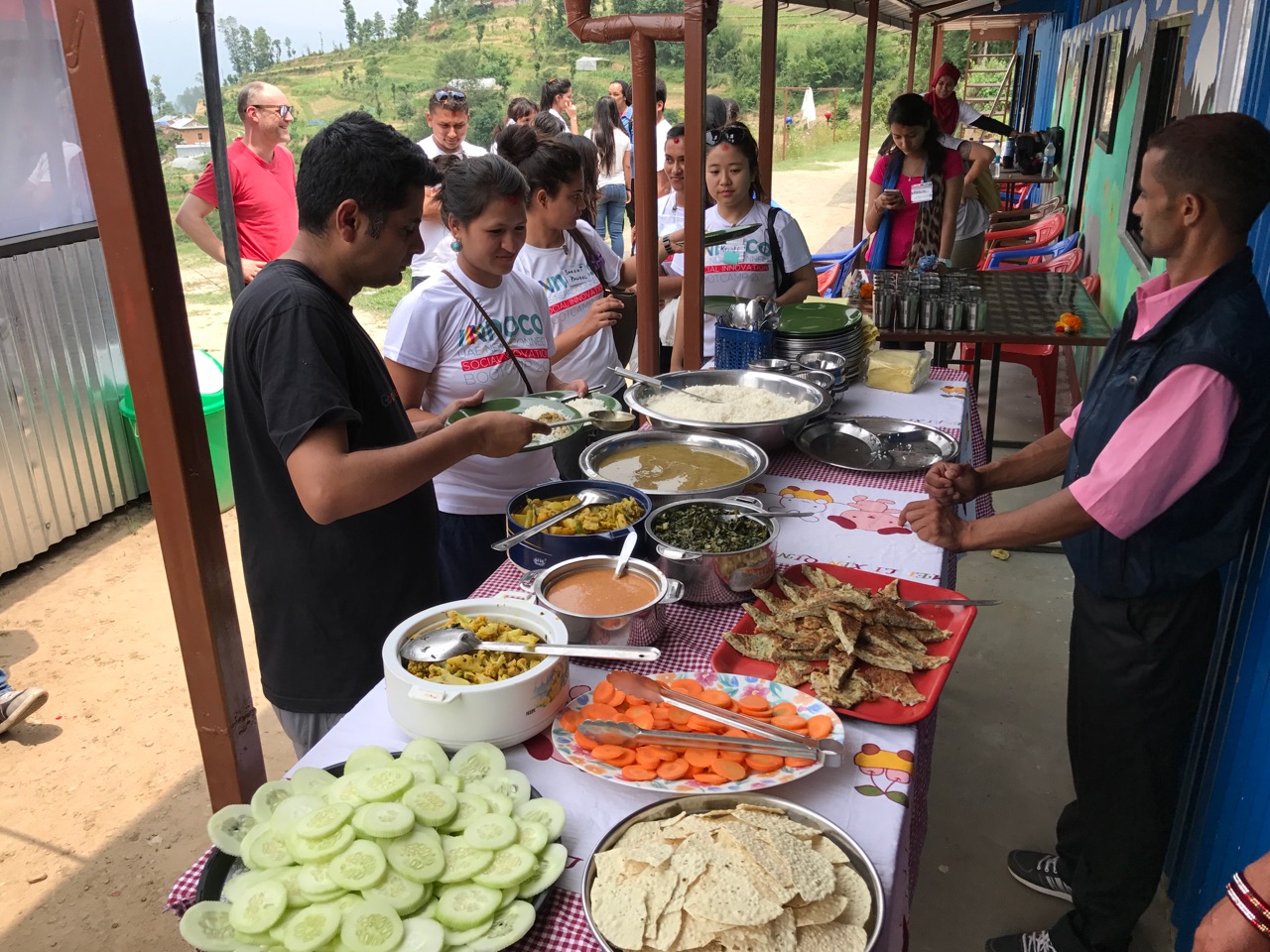
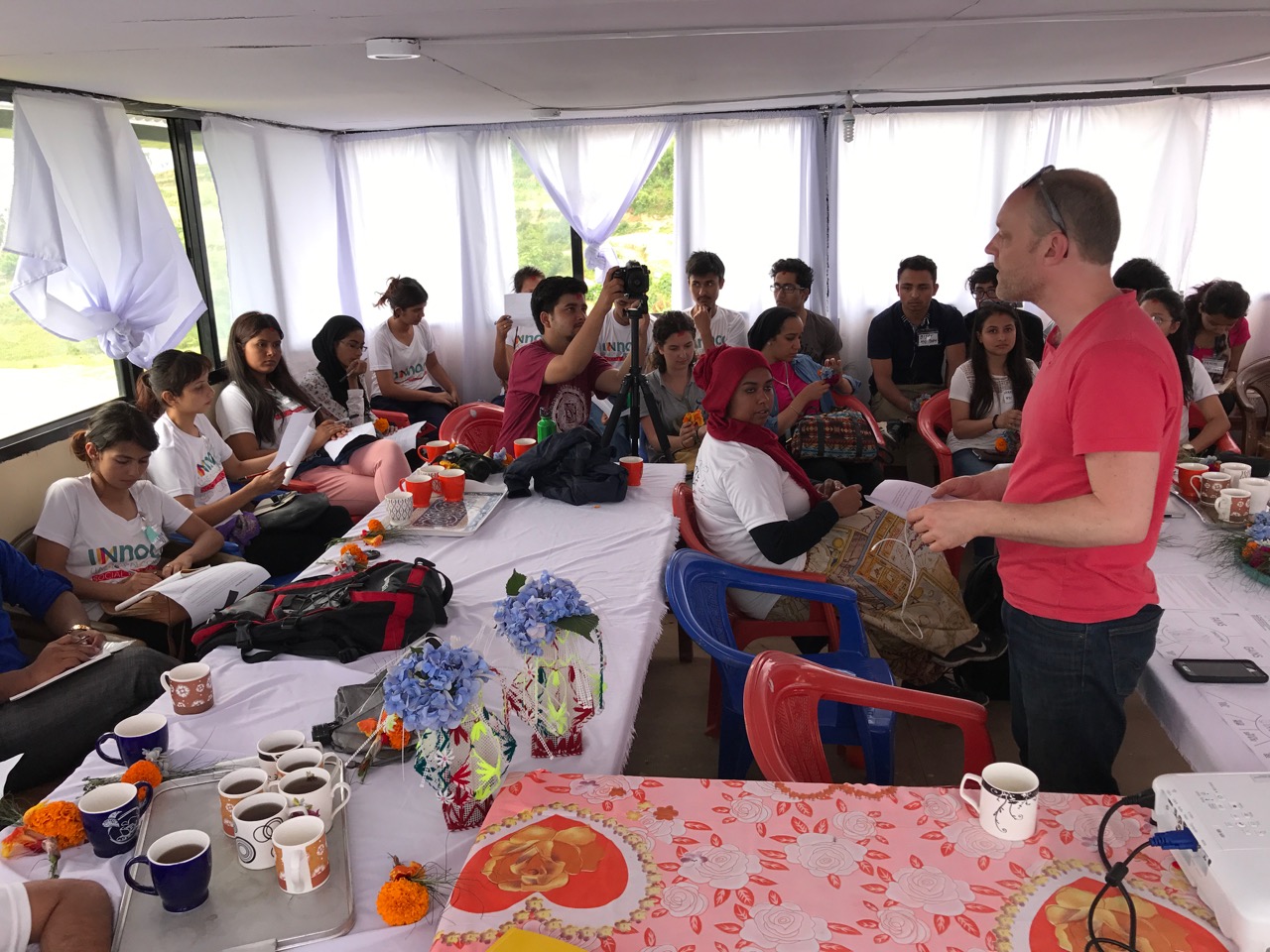

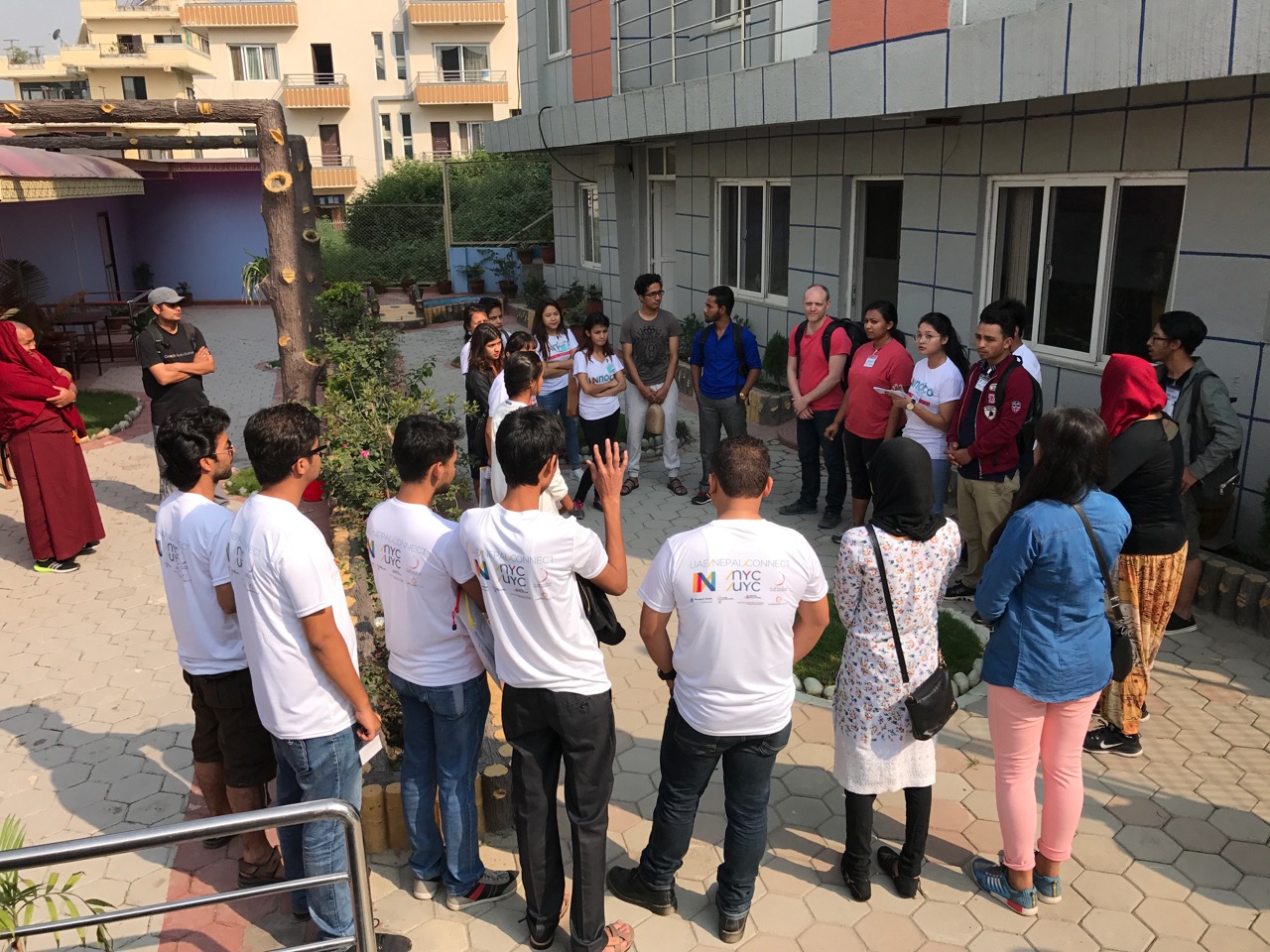
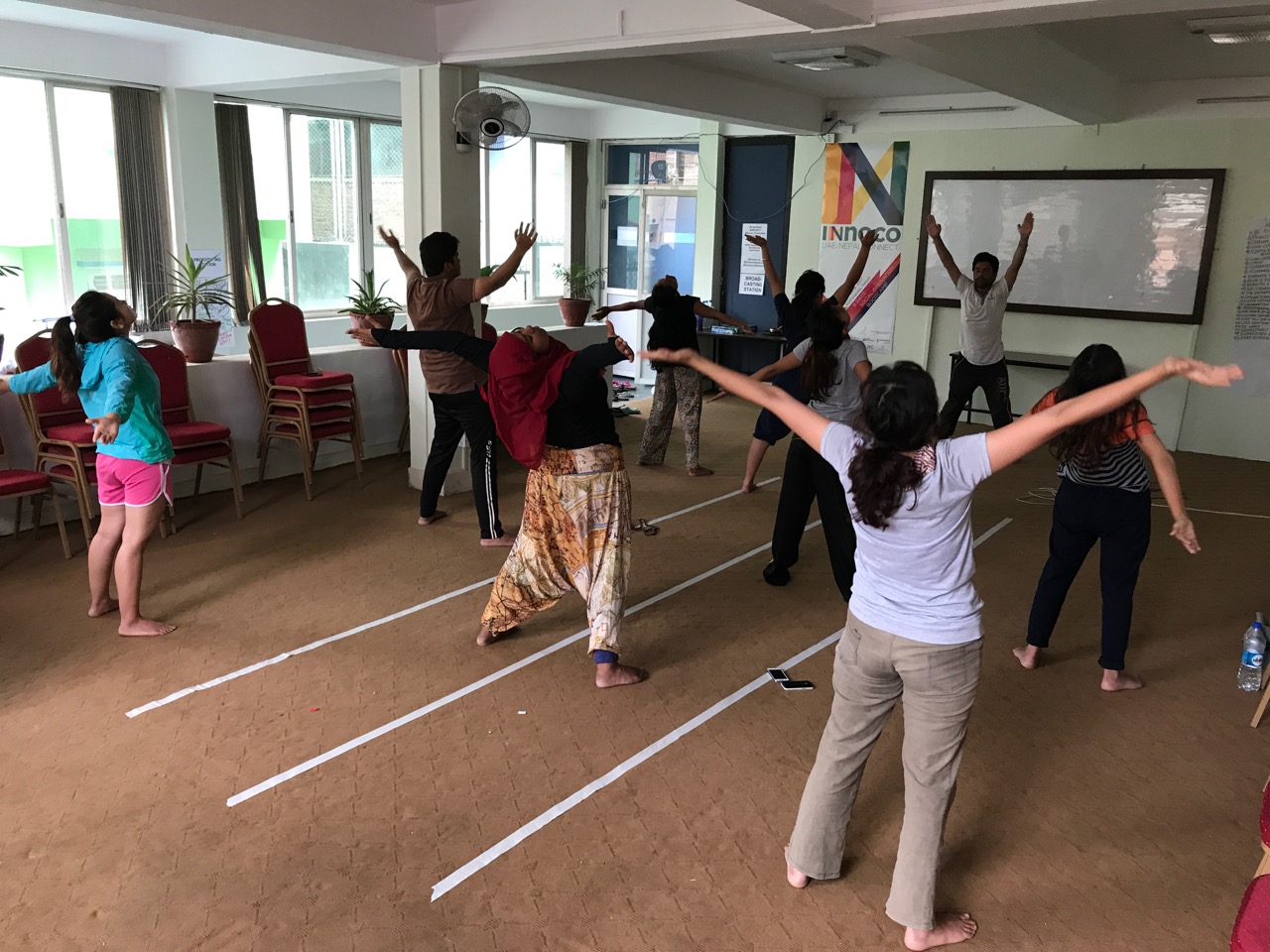

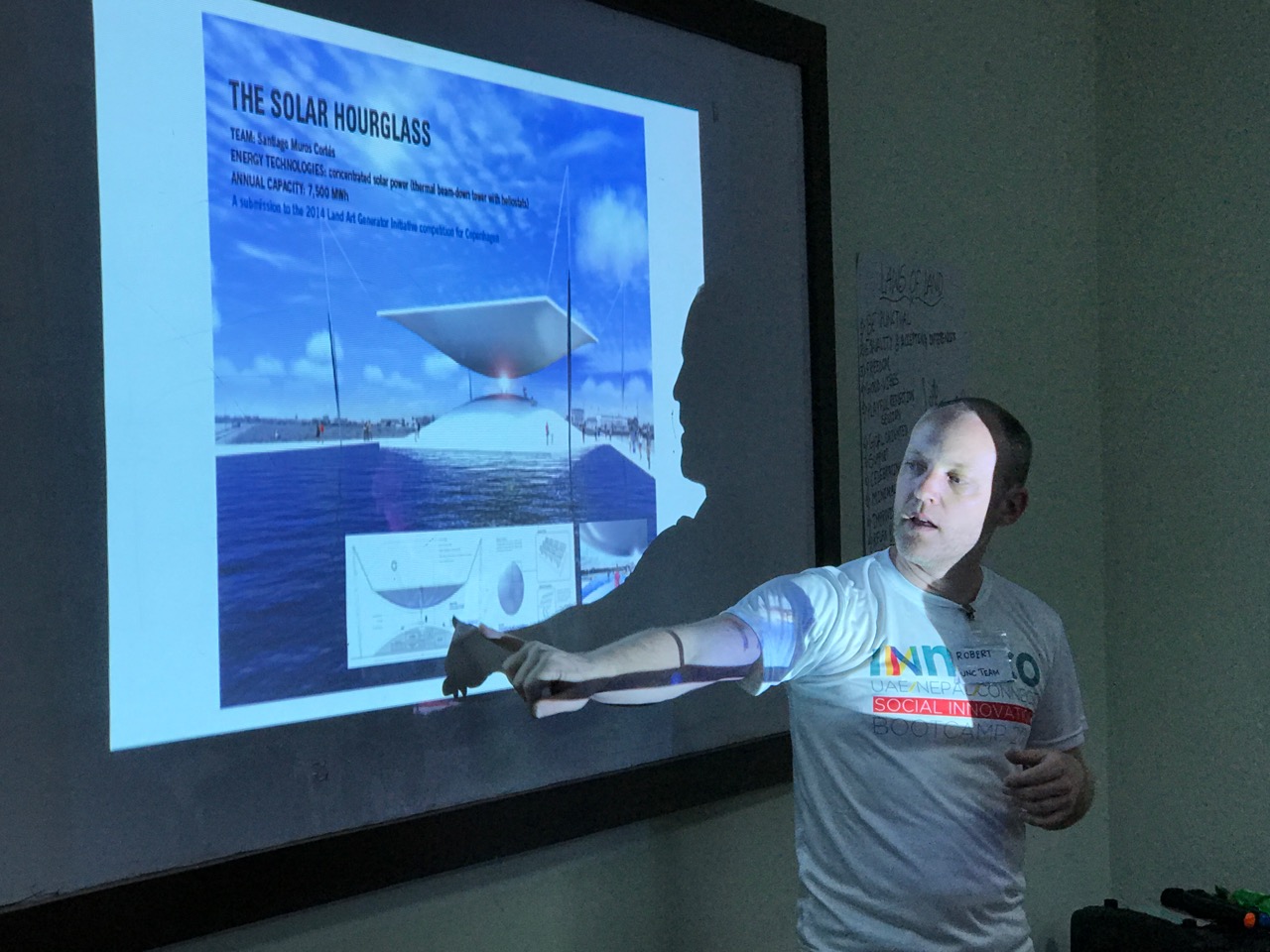
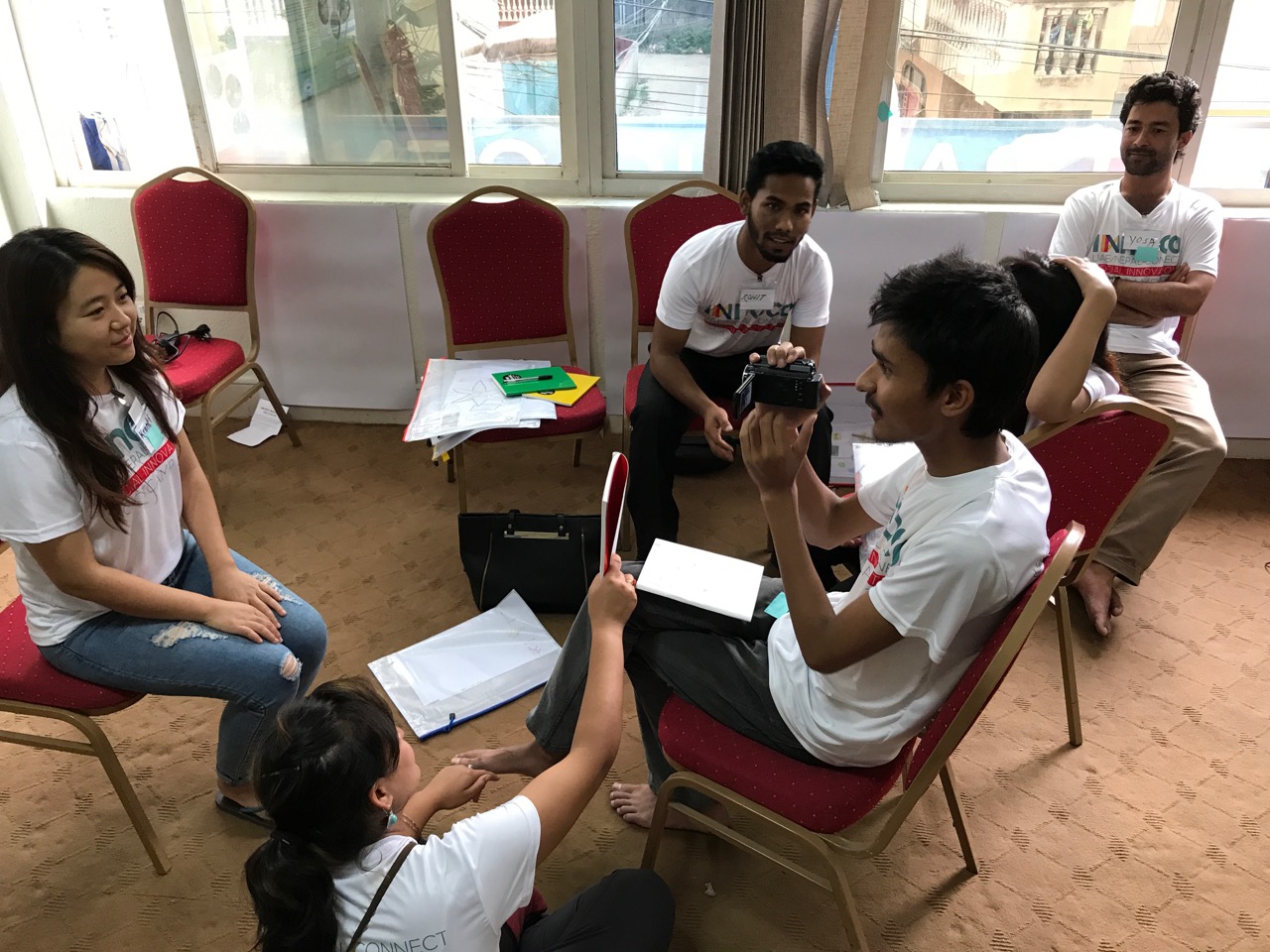
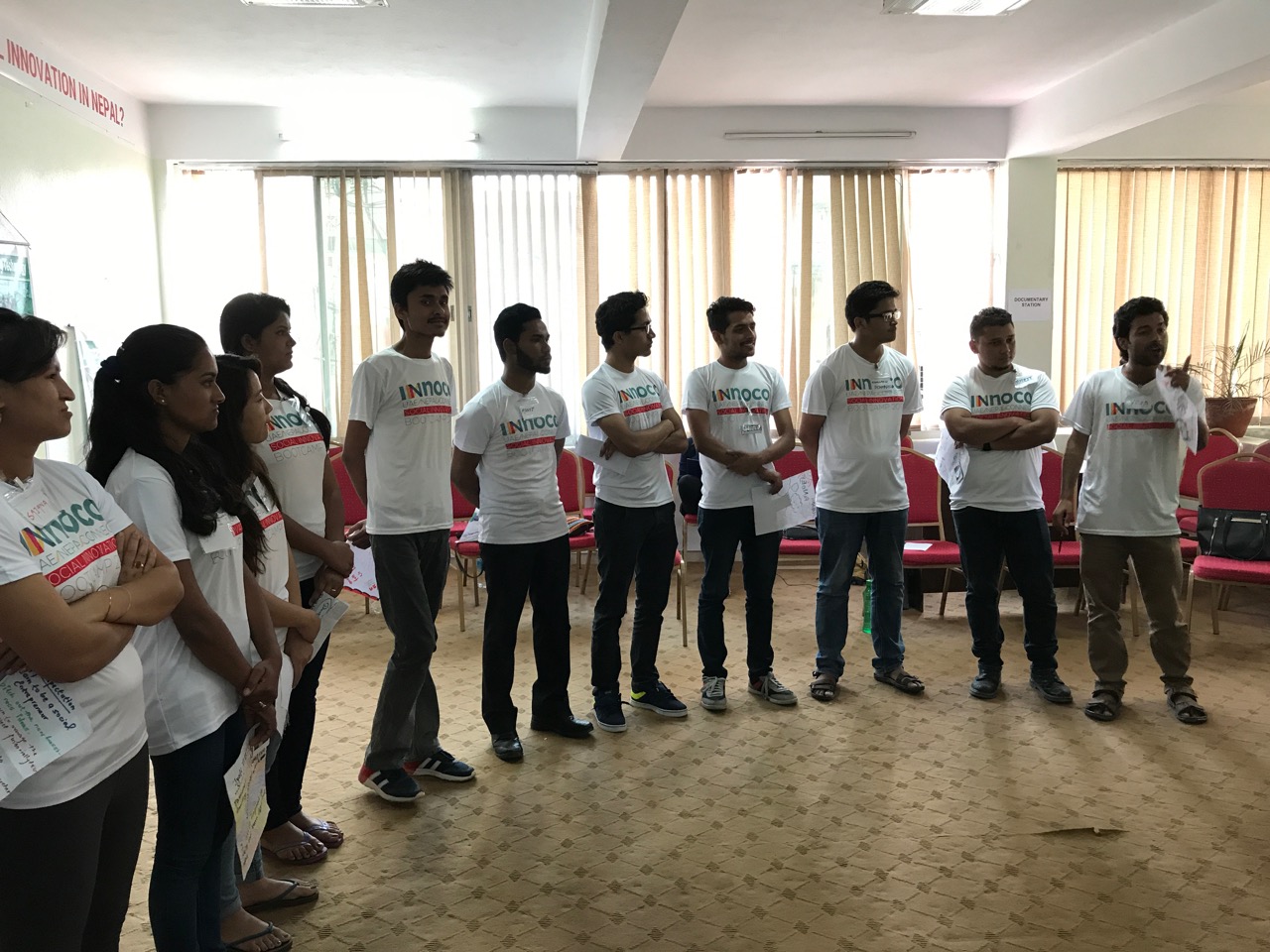

UAE/NEPAL/CONNECT Social Innovation Bootcamp 2017
June 02-10, 2017 at ICA Training Centre, Balkumari, Lalitpur, Nepal with Young Innovators
UAE/Nepal/Connect(UNC) is part of the INNOCO program, in which youth from the UAE and Nepal are connected to collaborate and learn how to contribute to their communities with social innovation. We will explore sustainable solutions for Nepal. UNC2017 is intense boot-camp with 25 Nepali youth.
During this bootcamp, participants experience innovative transformation by identifying the needs, learning tools to validate ideas, and envisioning a social business to bring about positive changes in their community. Empathy-Driven Tools assist them to develop ideas and meet the creative genius within themselves; such as empathy interviews, rapid prototyping, user testing, and radical collaboration.
Participants document the “what, why and how” of social enterprises through Head-Heart-Hands-On activities and Do-It-Yourself practices as working with inspiring guest lecturers, practitioners in social work fields and case studies. By learning the relationship of People-Planet-Profit and 3 aspects of biz model; Desirability-Viability-Feasibility, they are challenged to create social innovation experiences. The final outcome will be a creative pitch presentation to invited juries.
OBJECTIVES
To engage participants to build their creative confidence, to define social needs, and develop a viable social enterprise model or to become community agents and/or facilitators of the program.
To provide head-heart-hands-on learning opportunities with existing social enterprise models.
To produce innovative ideas that impacts on social innovation development within the Nepali and UAE community
EXPECTED OUTCOMES
TRANSFORMATIVE EXPERIENCE FOR YOUTH to become leaders and innovators in their communities as experiencing their own journeys of trial, challenge and transformation with clarity, positivity, and energy.
GROWTH OF NEPAL YOUTH CLUSTER to develop multiple entrepreneurial and leadership skills in interdisciplinary environments as expanding their mentoring network of organisations, experts, professionals, and community-minded individuals to support the on-going work of the NYC.
CONTRIBUTION TO DOCUMENTARY & INNOVATION MODEL: INNOCO will be working with the UAE, Nepal and International community to develop an interactive documentary series and innovation model towards youth empowerment and the power of social entrepreneurship. A replicable prototype and long-term strategic planning document will provide a path to broad implementation of solutions in a community that can be scalable.
Program
is about
Generate big ideas through design thinking experience
Learn how your innovation space works
Understand the relationship of innovation space and biz model
Exercise how to create experience innovation
Refine social business model canvas
Pitch a biz idea
Design
Challenge
The people of Nepal can use your help. There are many opportunities to improve wellbeing and quality of life, and you are the person with the creative mind who can present useful solutions to some of society’s most pressing challenges. Coming up with an innovative solution to a problem or opportunity isn’t easy. To help us innovate, we will follow the design process step by step. Whether or not we are aware of it, the design process represents the steps that we all go through when we solve problems—from the very simple to the very complex. It has applications in industrial design for tools and products, architectural design for buildings, process design for manufacturing, policy design for regulations, and (for our purposes) social innovation design to deliver products or services that can make people’s lives better.
Design Process
Step 1: Understand the Context and Beneficiary Group (EMPATHIZE)
Step 2: Identify the Problem to Address (DEFINE)
Step 3: Ideate (BRAINSTORM)
Step 4: Sketches and Models (PROTOTYPE)
Step 5: Critique and Testing (ITERATE)
Step 6: Presentation (PITCH)
Step 7: Implementation (DO)
“UNC (UAE-Nepal-Connect) 2017 means a lot for me. It has always been a milestone for my leadership development. It has bolstered confidence in me to take leadership initiative in different situations. I have emerged as the problem solving, inspiring and energetic, enthusiastic leader at my work.”
-Subodh Pandey
“The bootcamp session has really changed my life. It was my first time to participate and the nine days stay with different social innovators and proper guidance from facilitators has molded me into a better version of myself.”
- Sajana Bhadel
“UNC (UAE-Nepal-Connect) 2017 acted like fuel to turn my thoughts into action. I'm able to witness the impact of boot camp in my thinking process and in my courage to take contingent action in my work life. The most powerful thing I have been practically applying in my life is the value proposition canvas and essence teamwork.”
- Anuja Niroula
“UNC (UAE-Nepal-Connect) experiences made me more strong, skillful and capable to do more work. My vision is to work so that youth can get the exposure and build themselves in each sector. I want to achieve youth engagement in every sector creating innovative ideas for social good.”
- Pabitra Mahji
